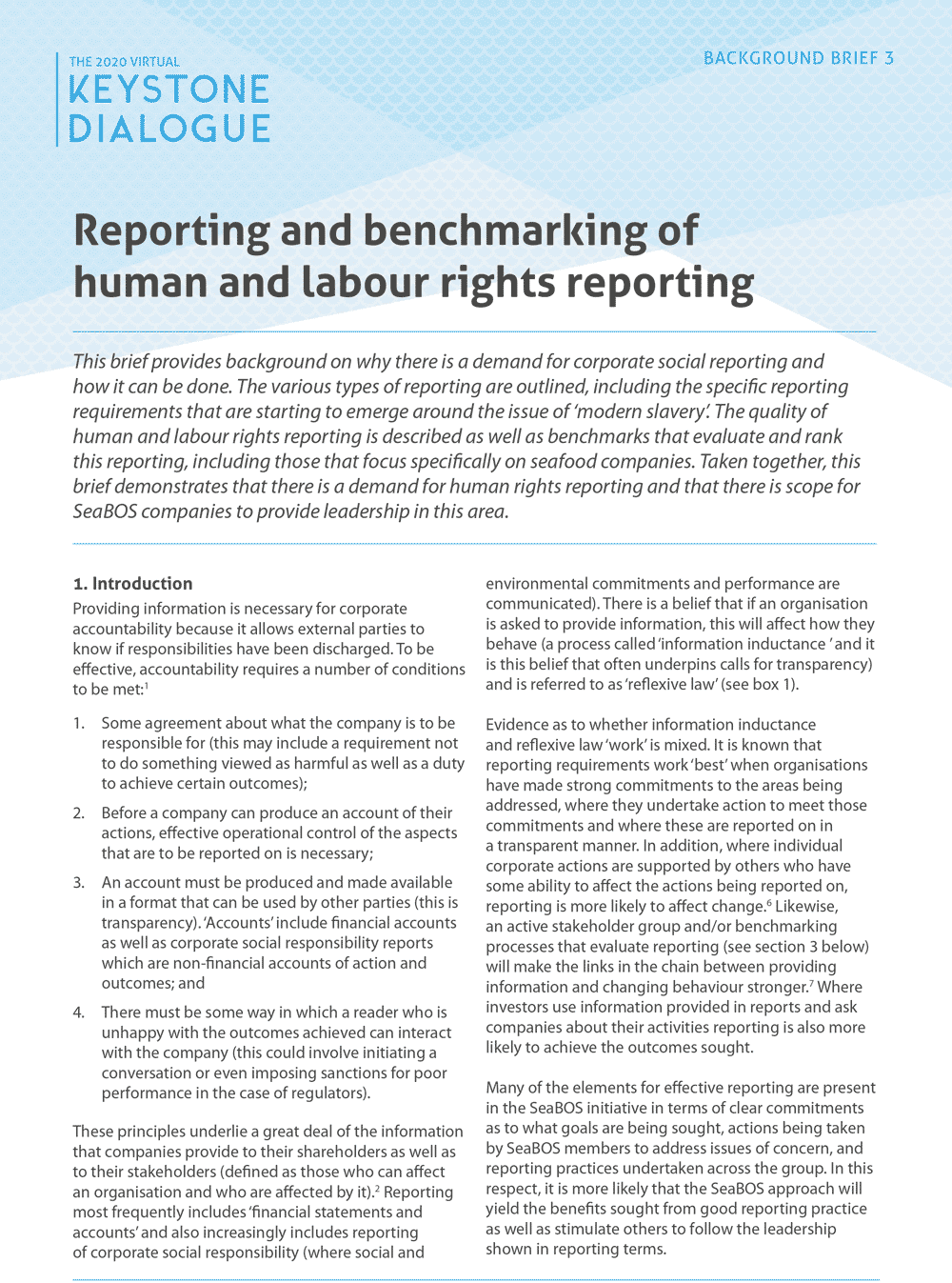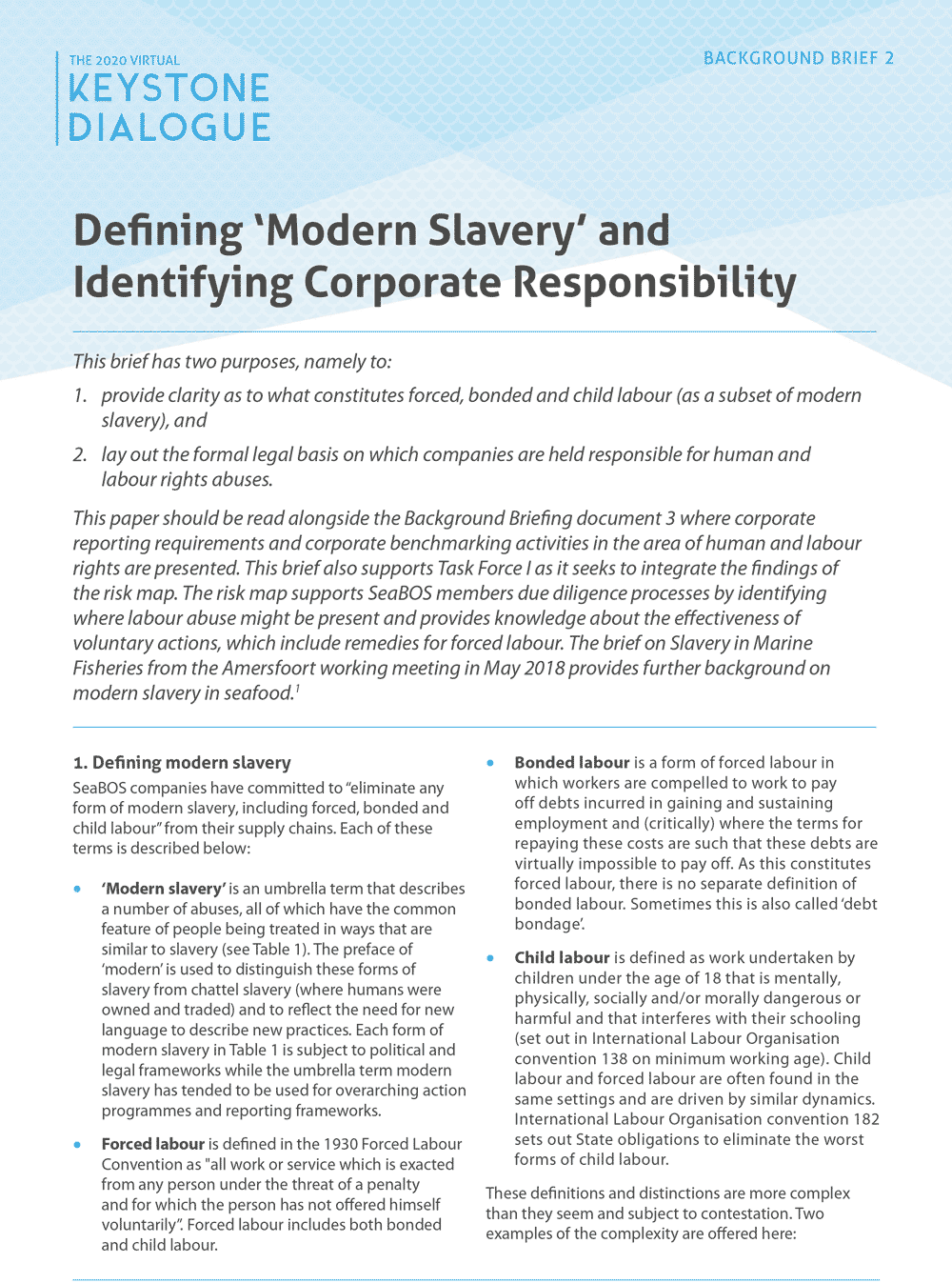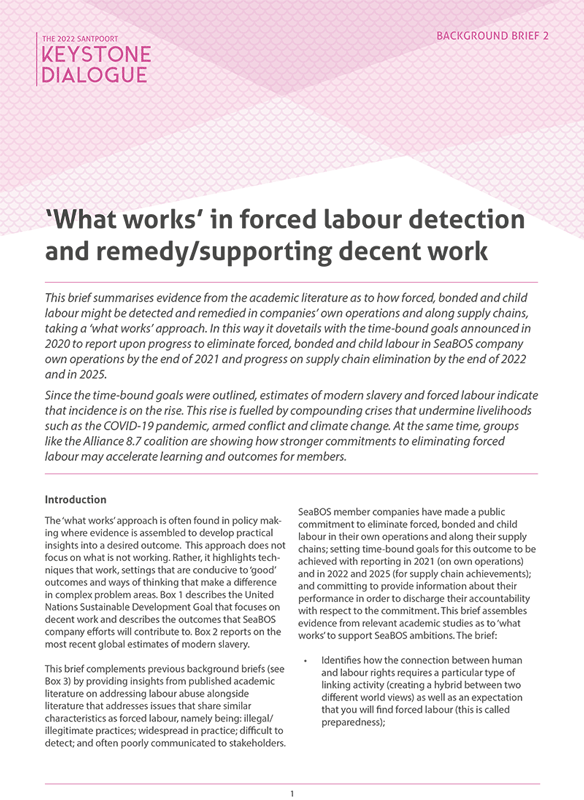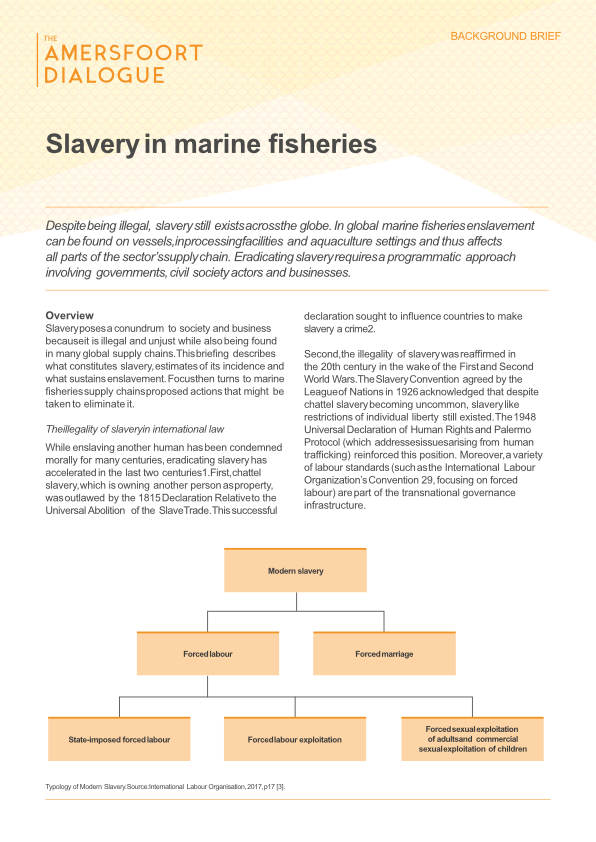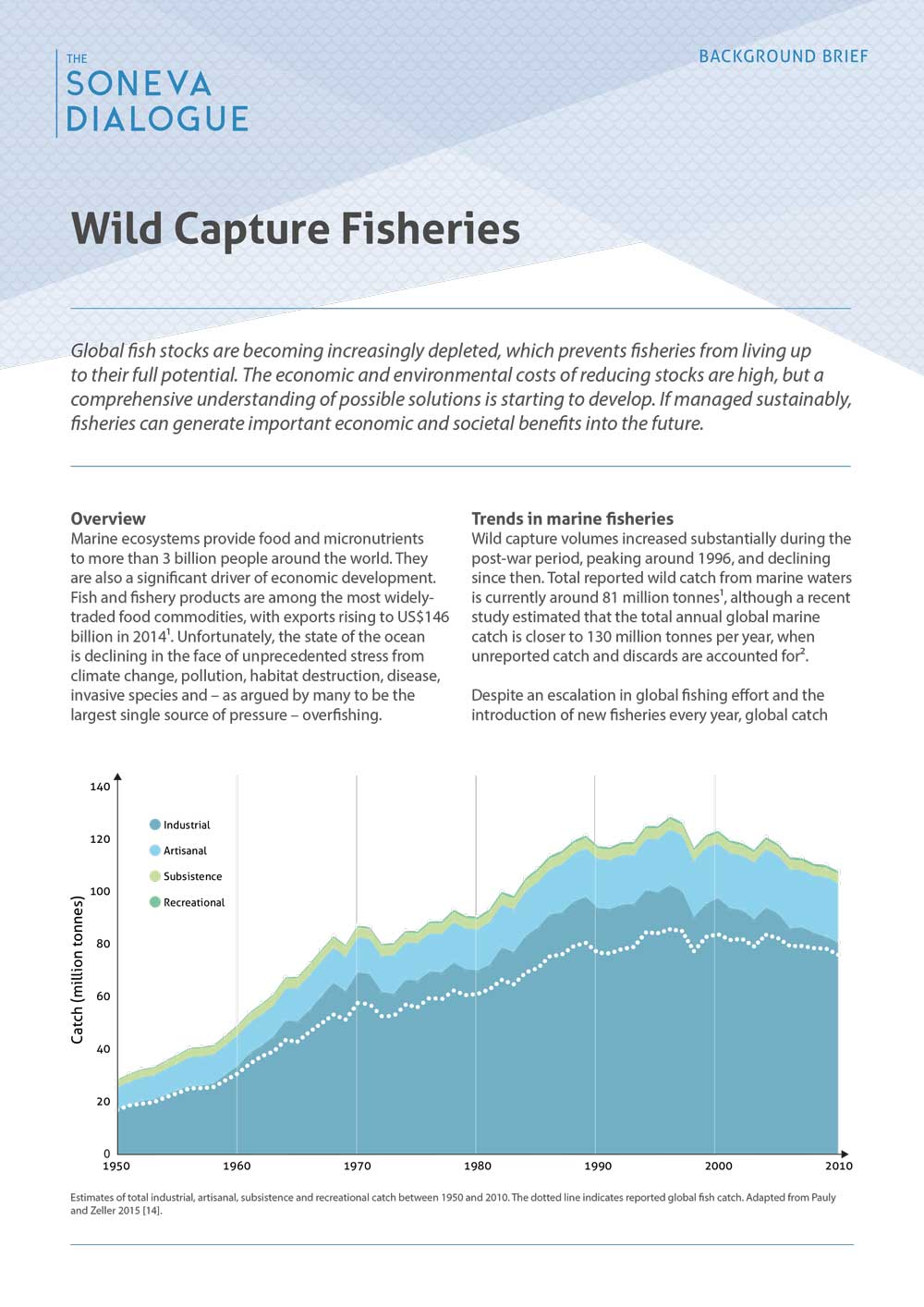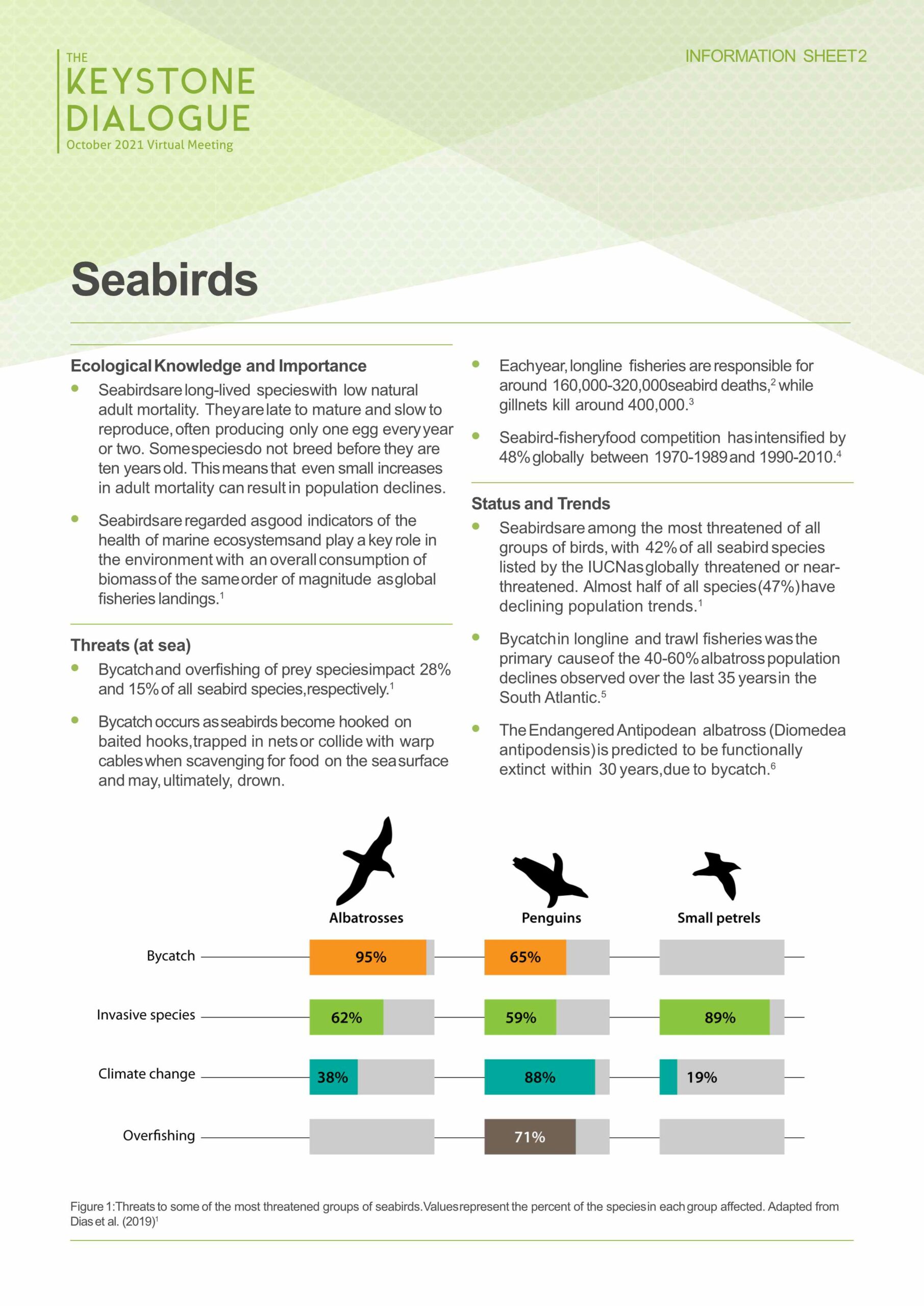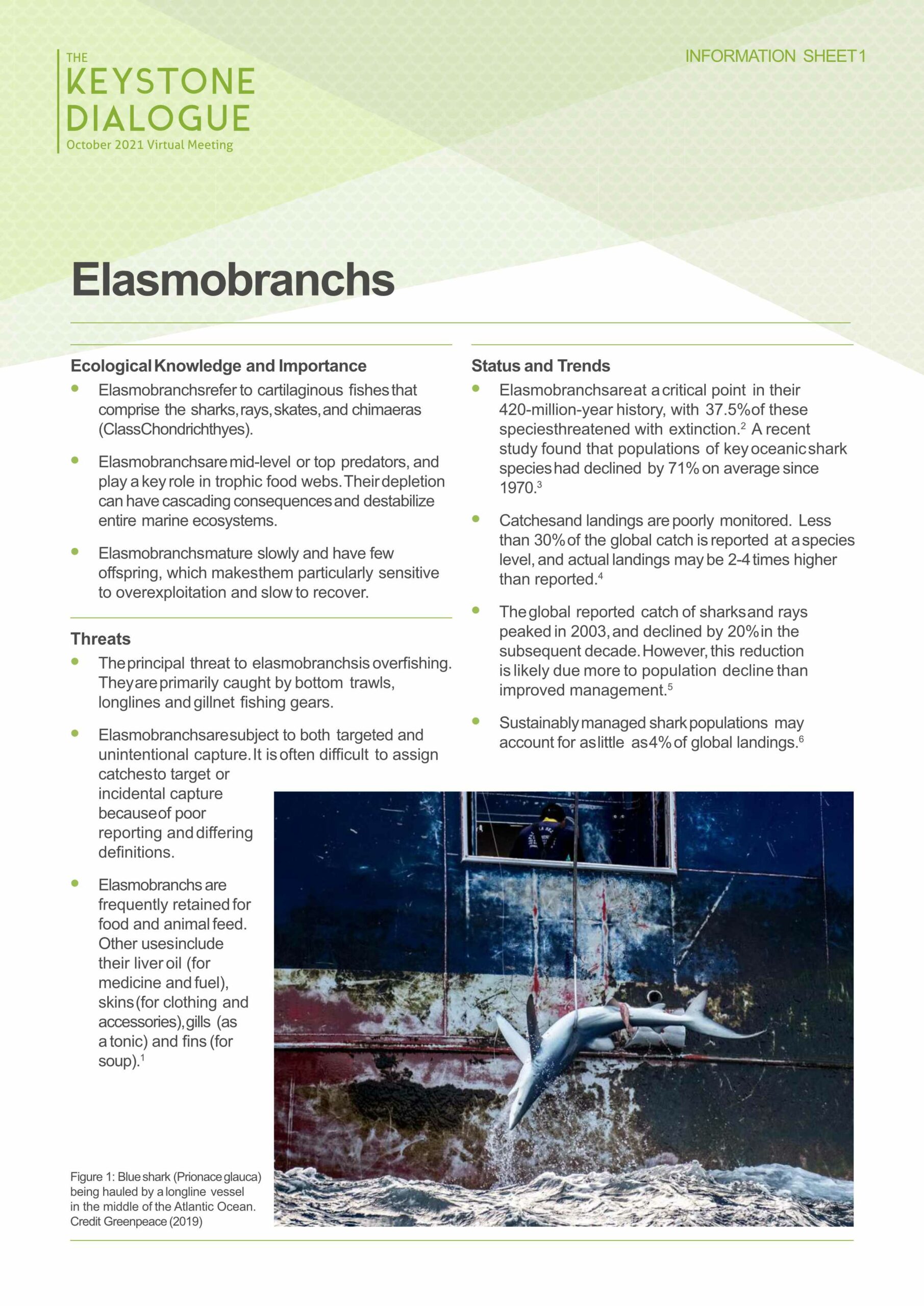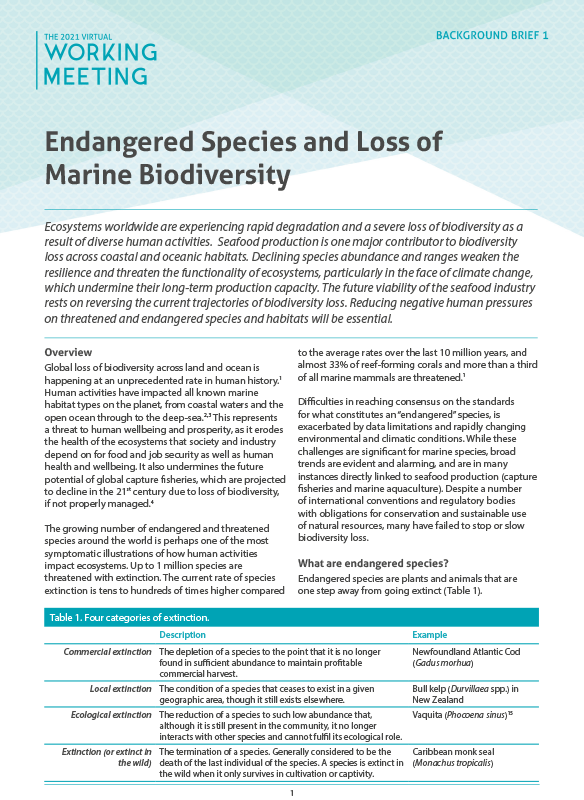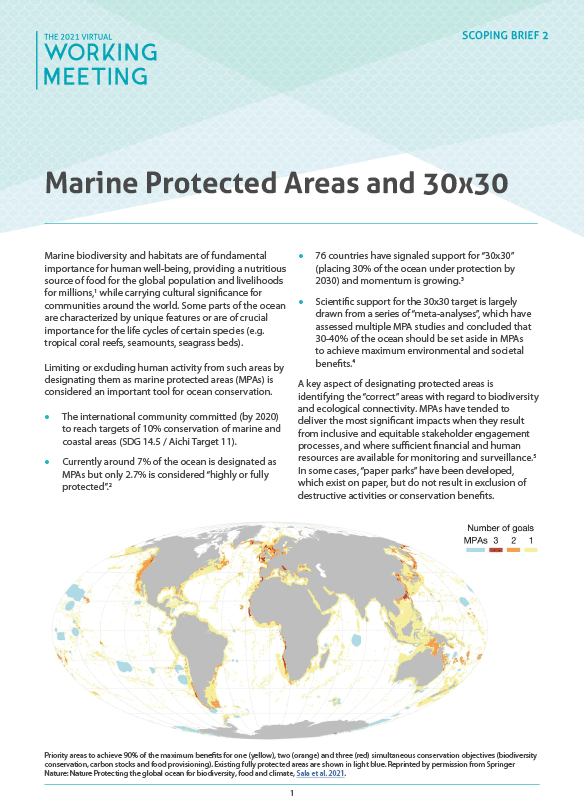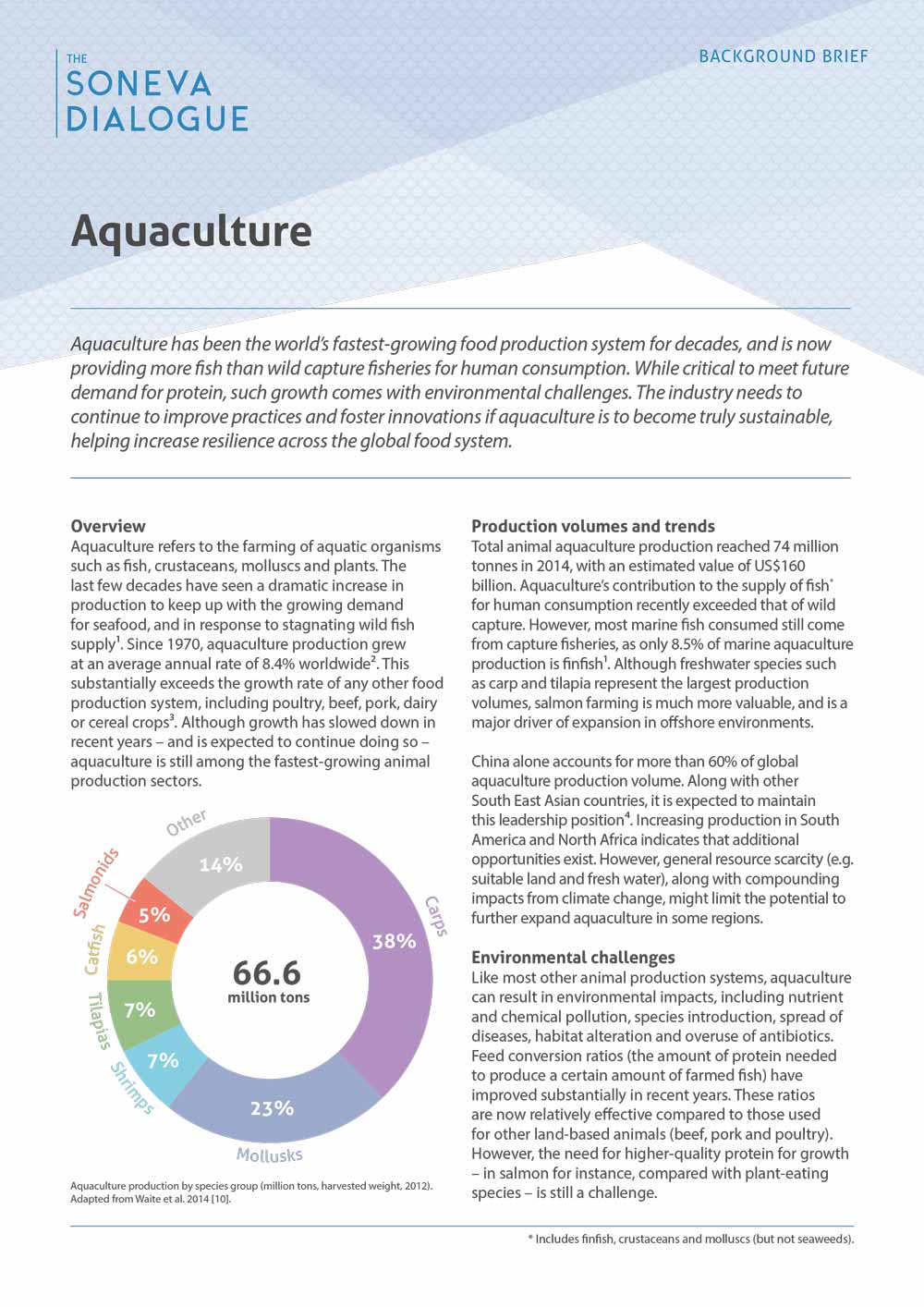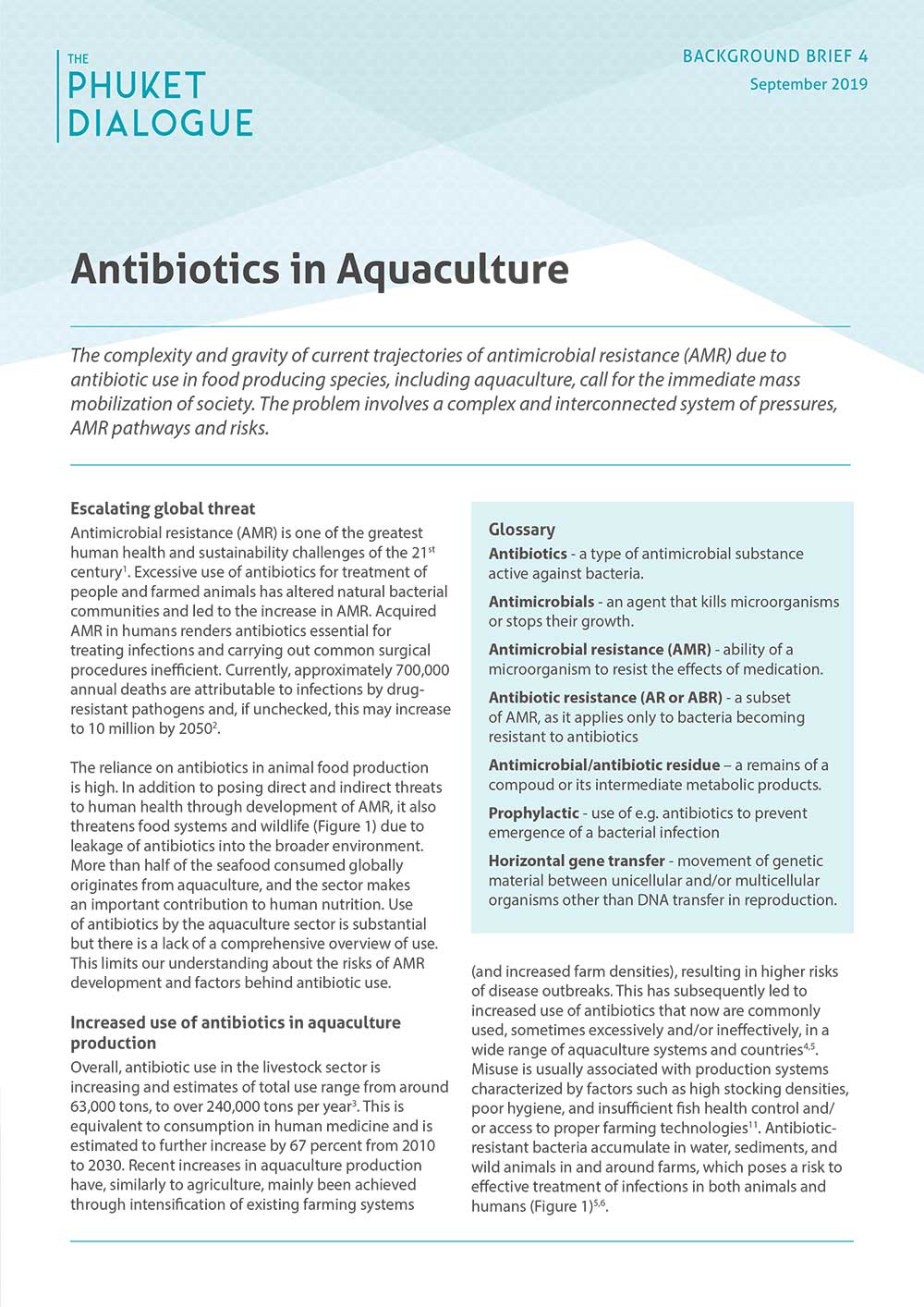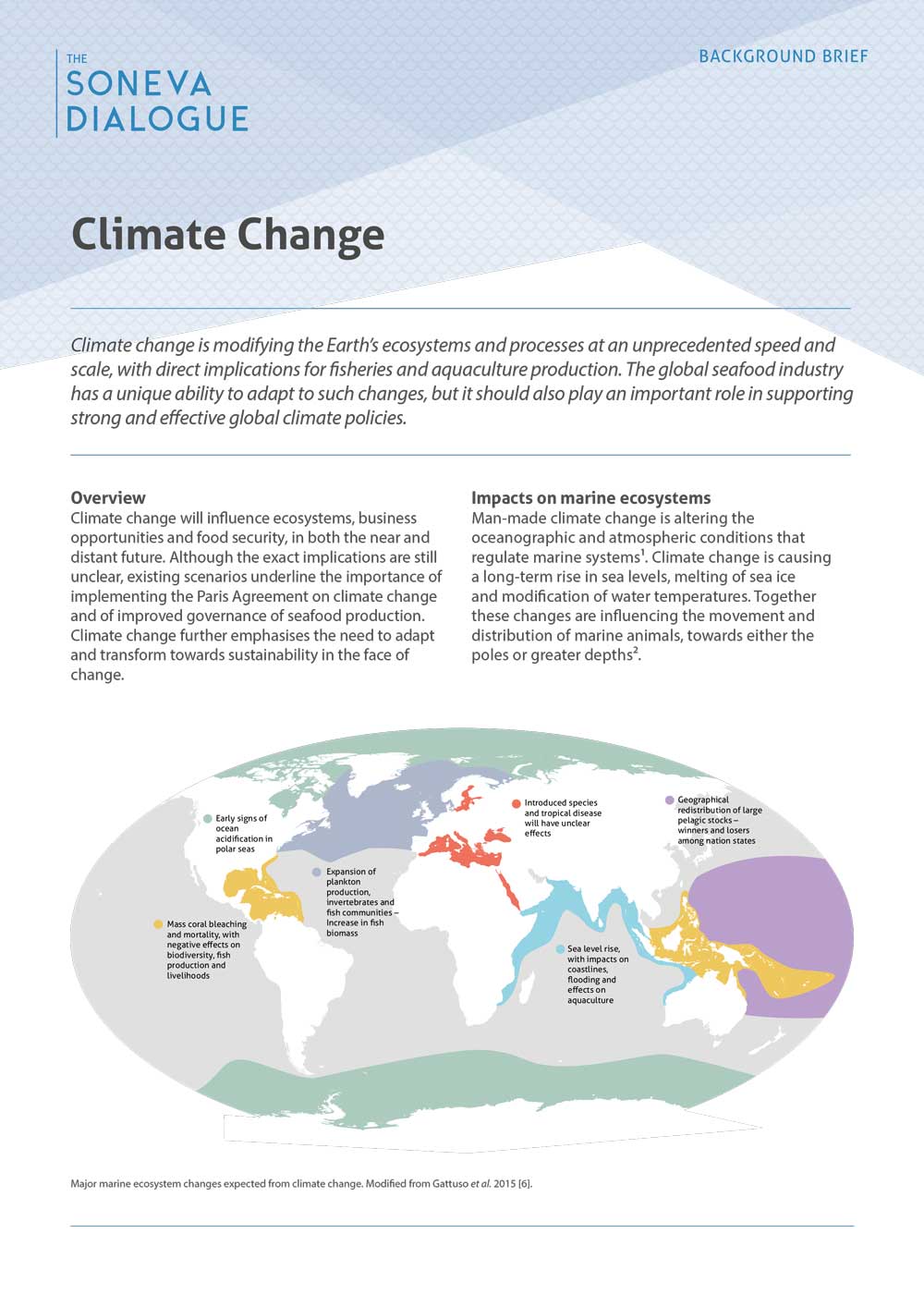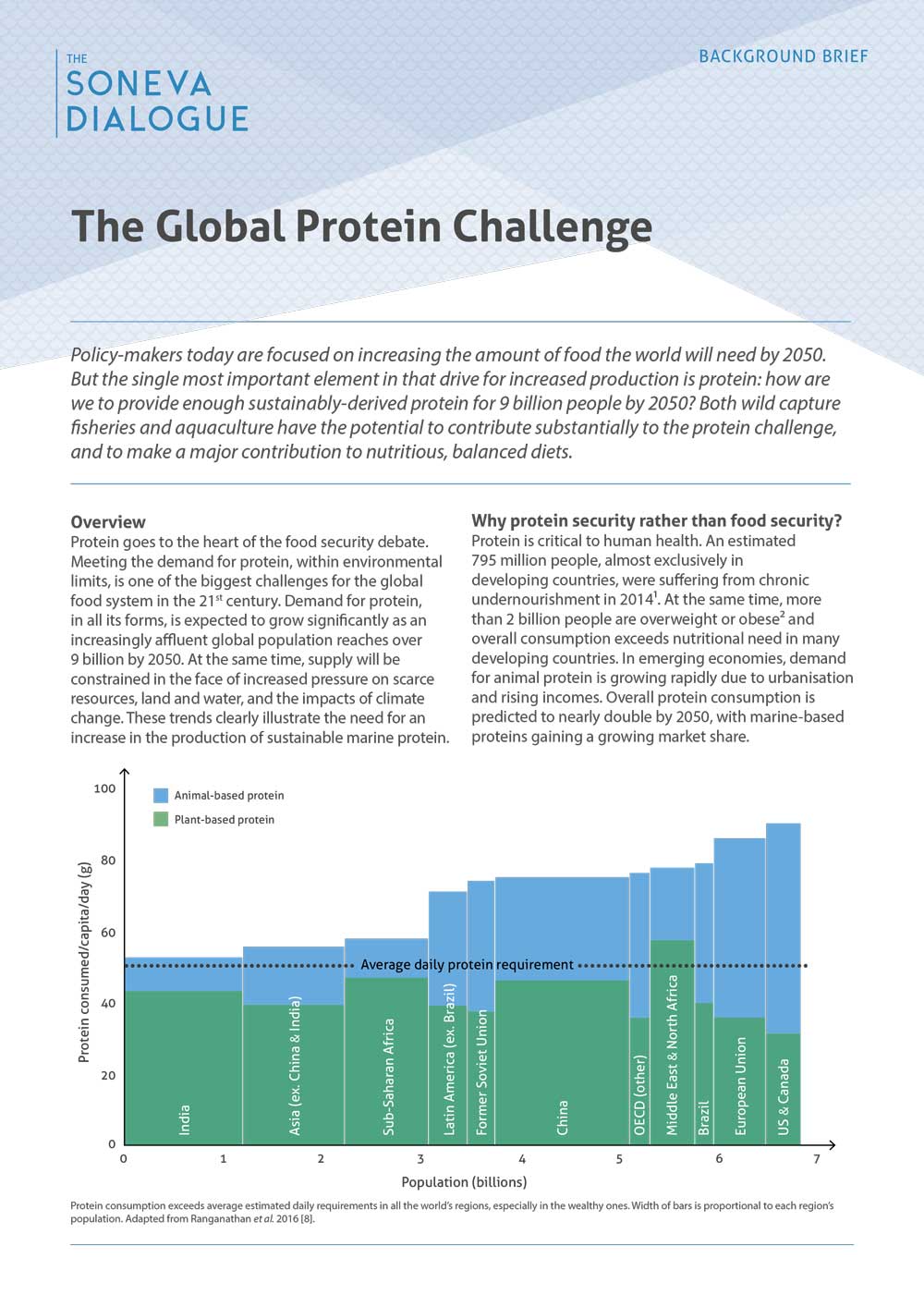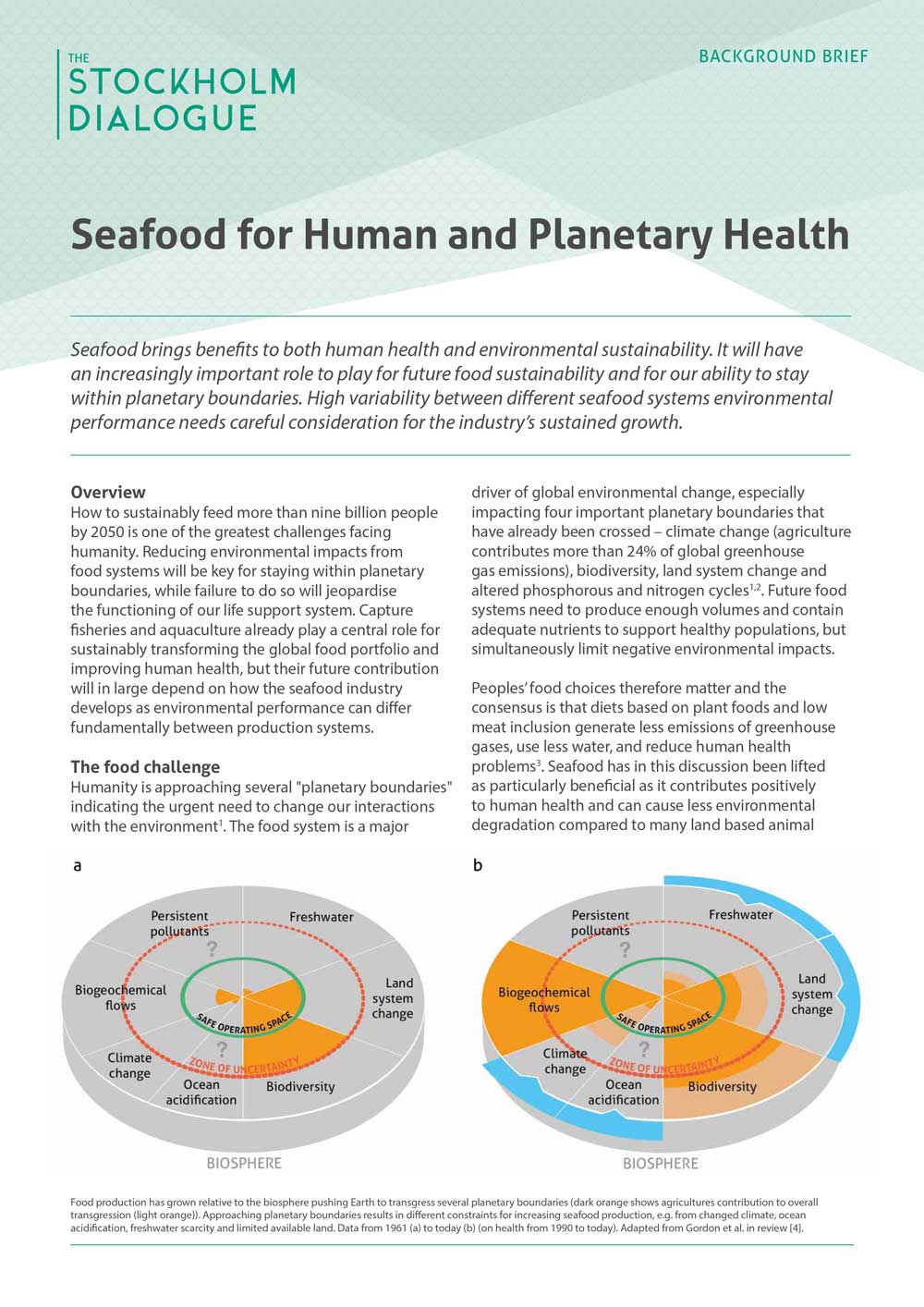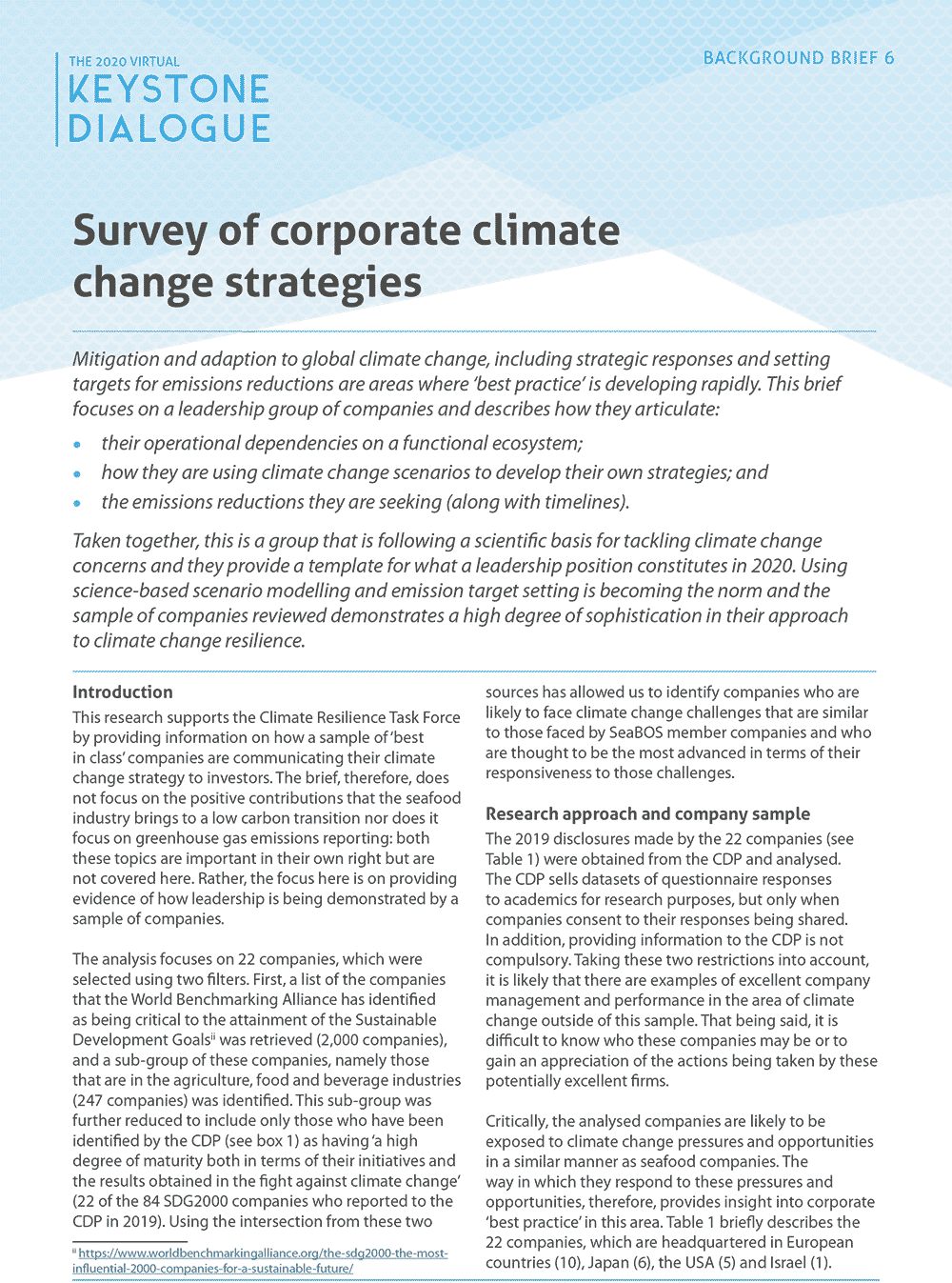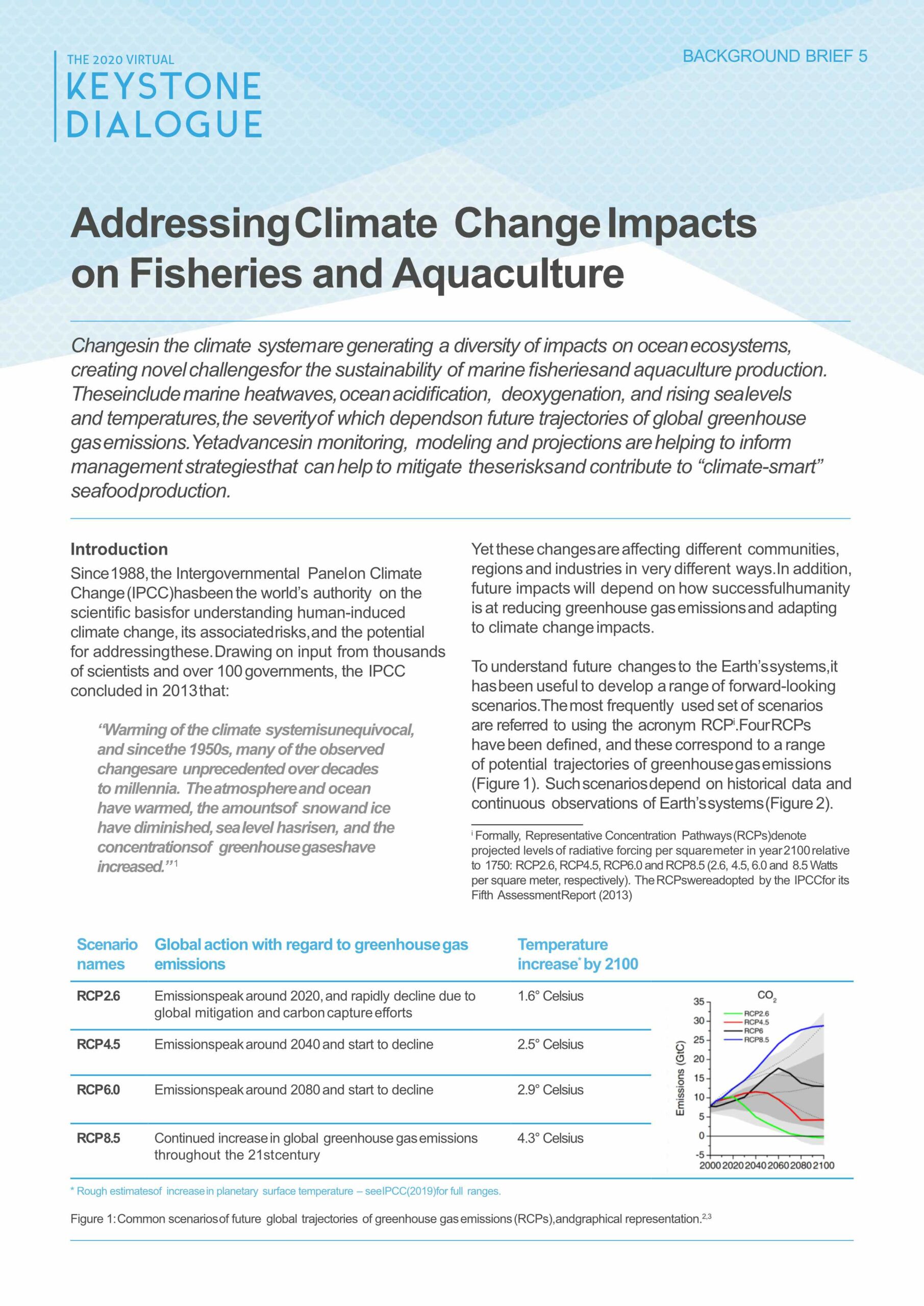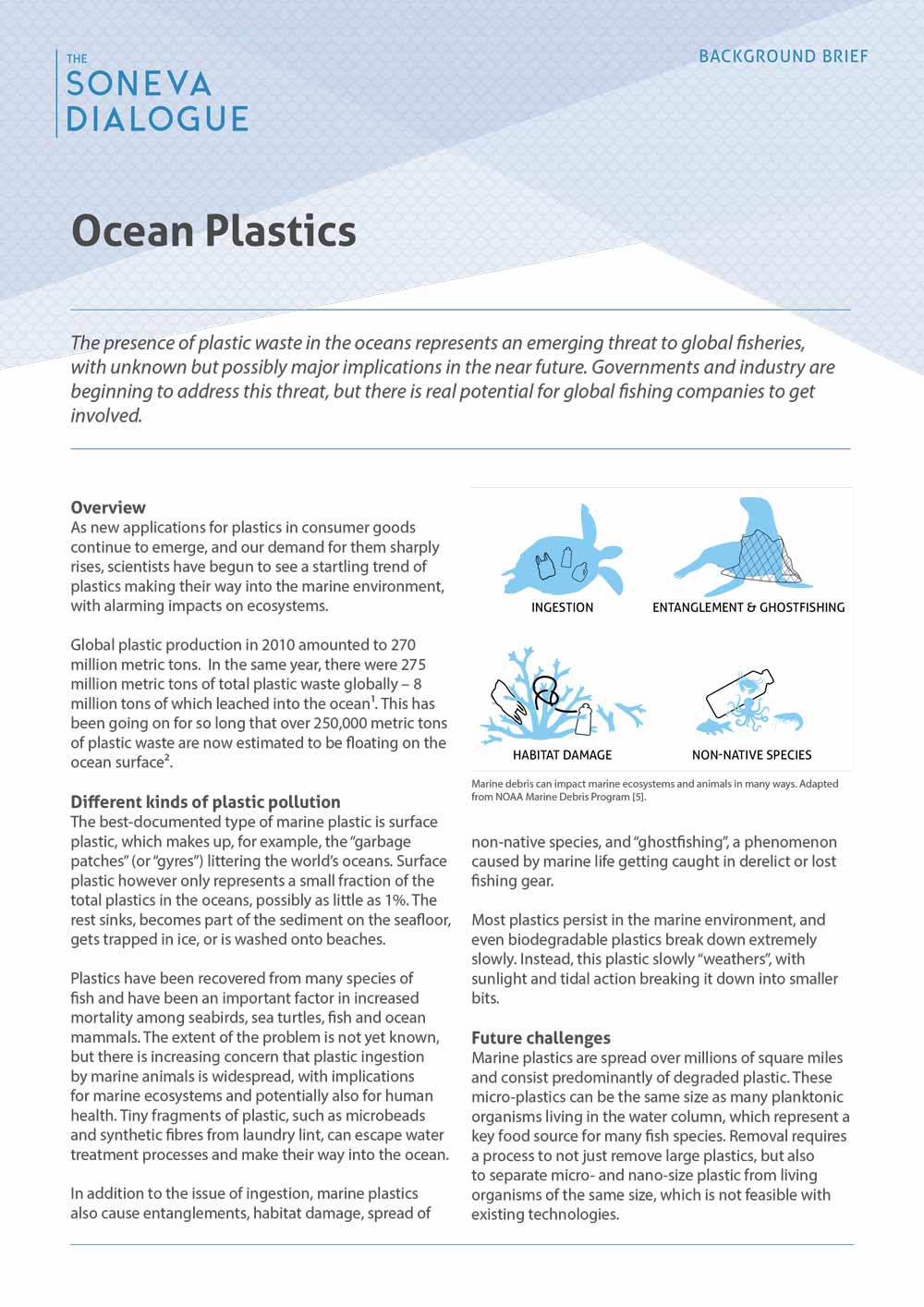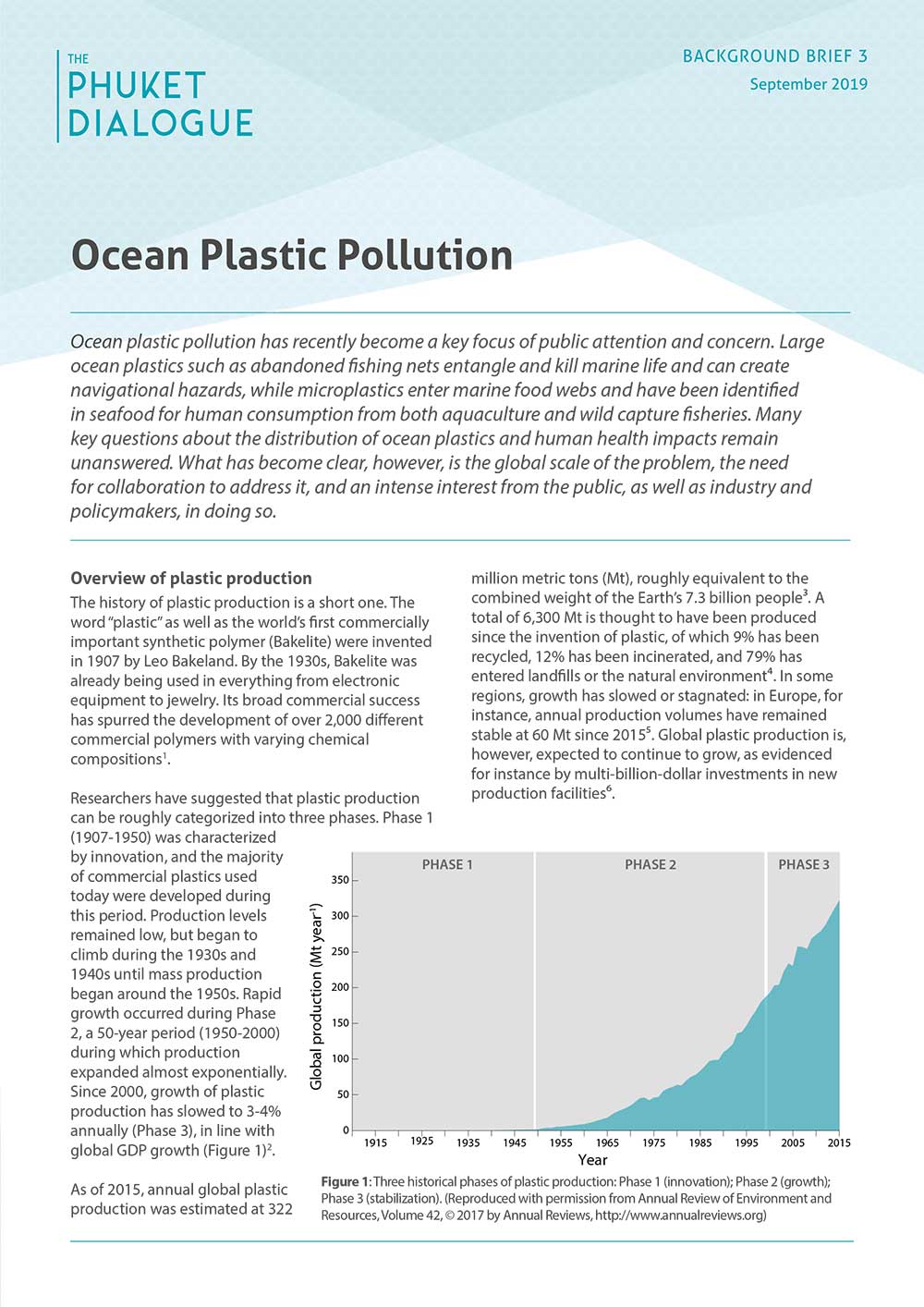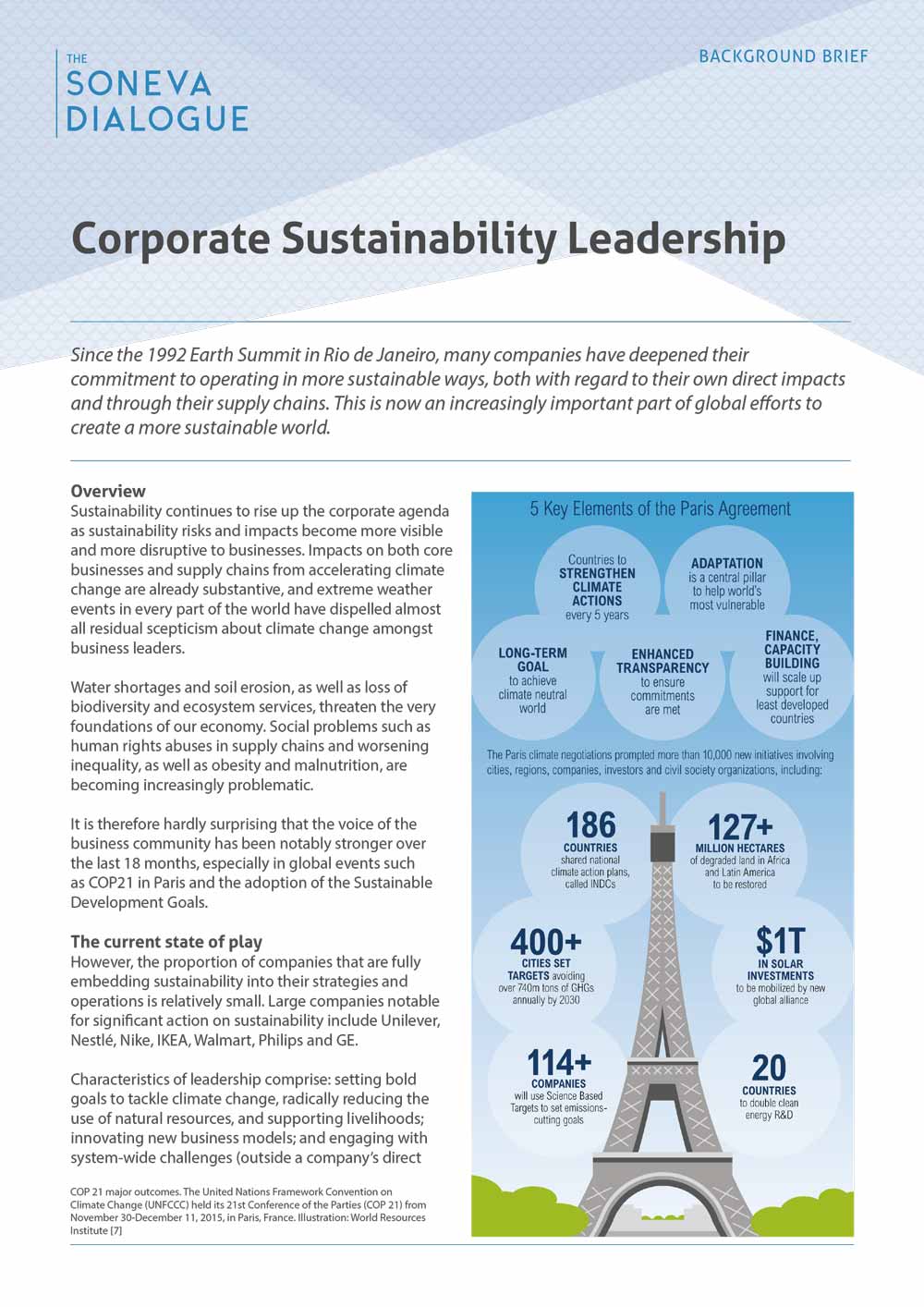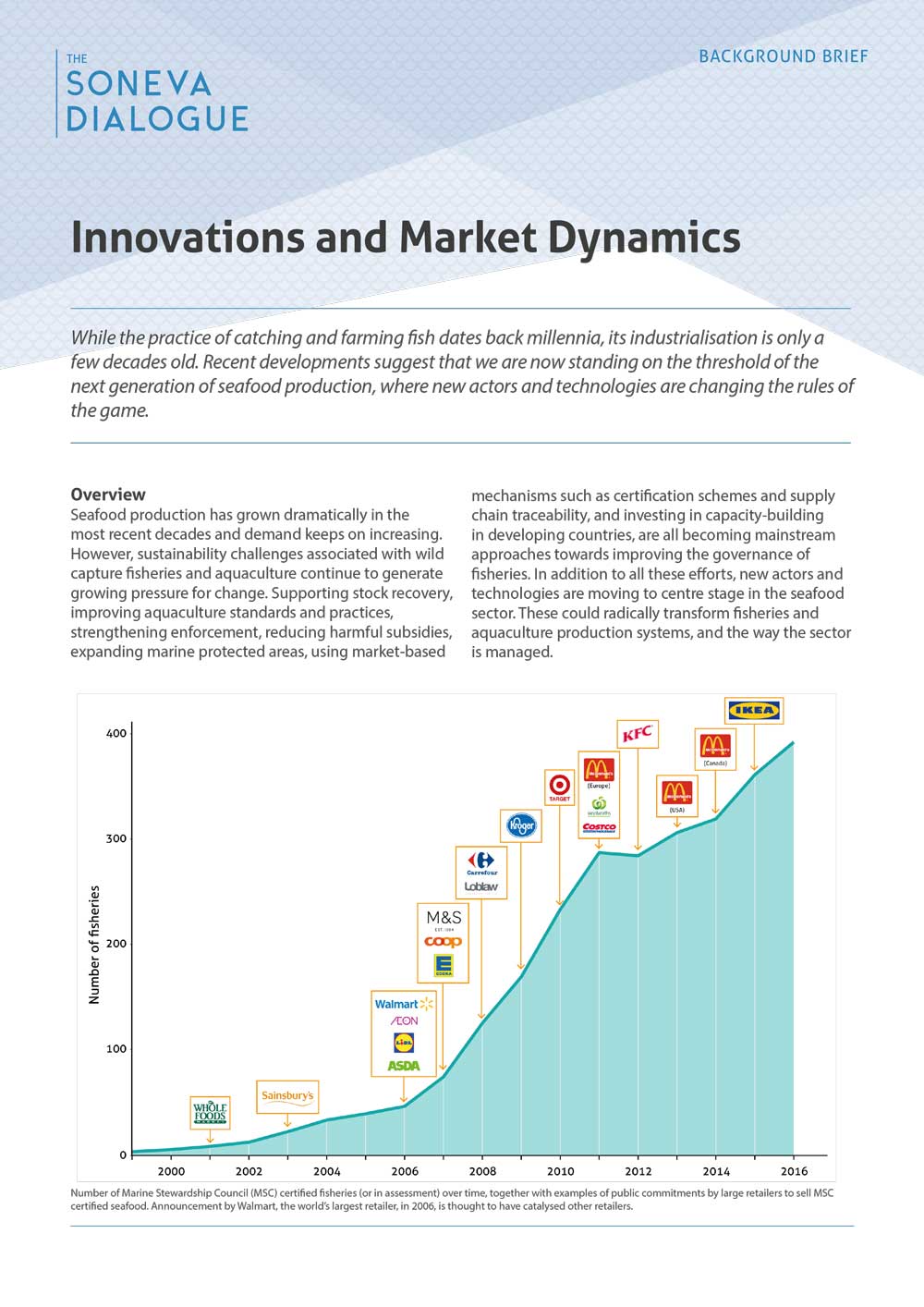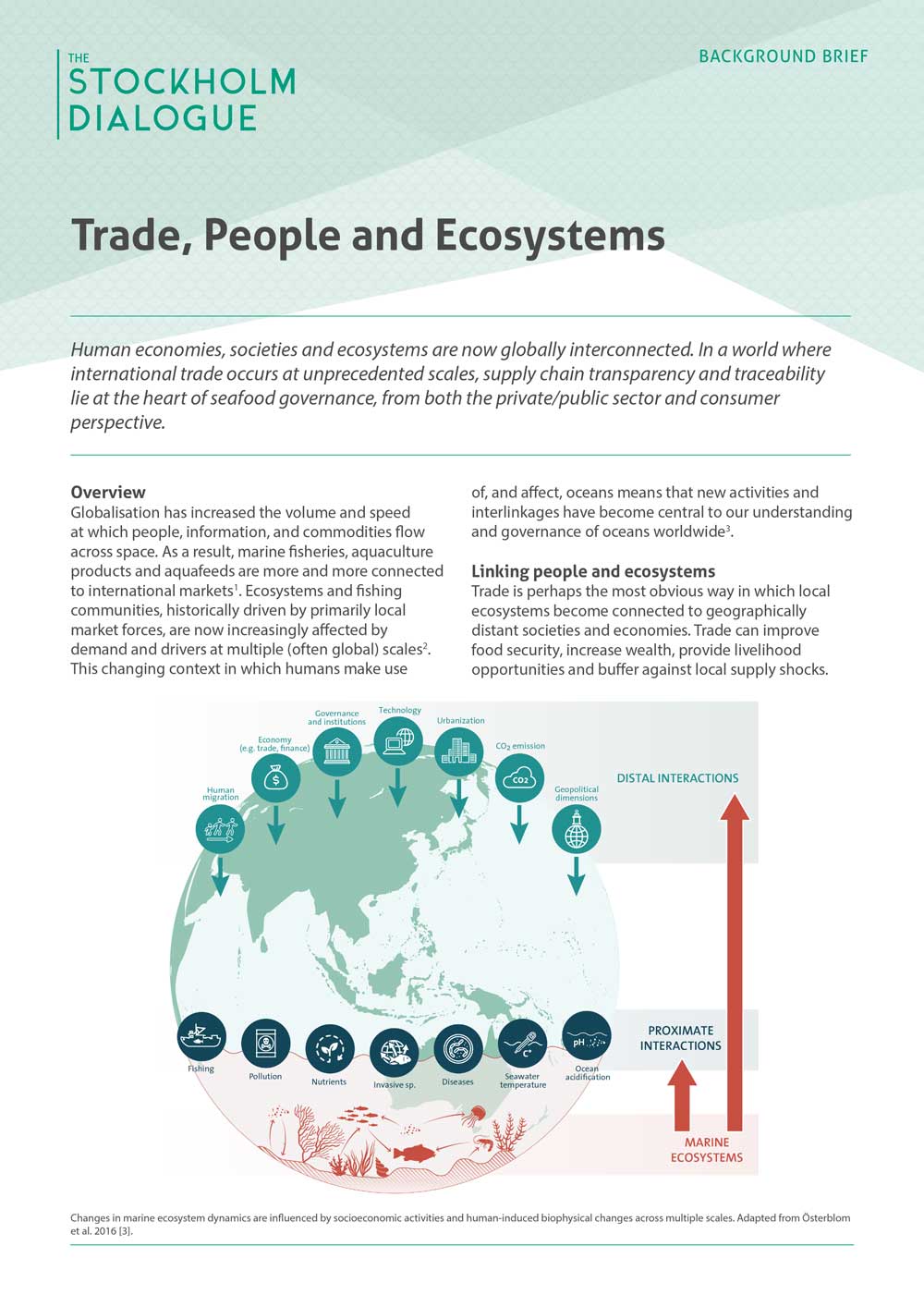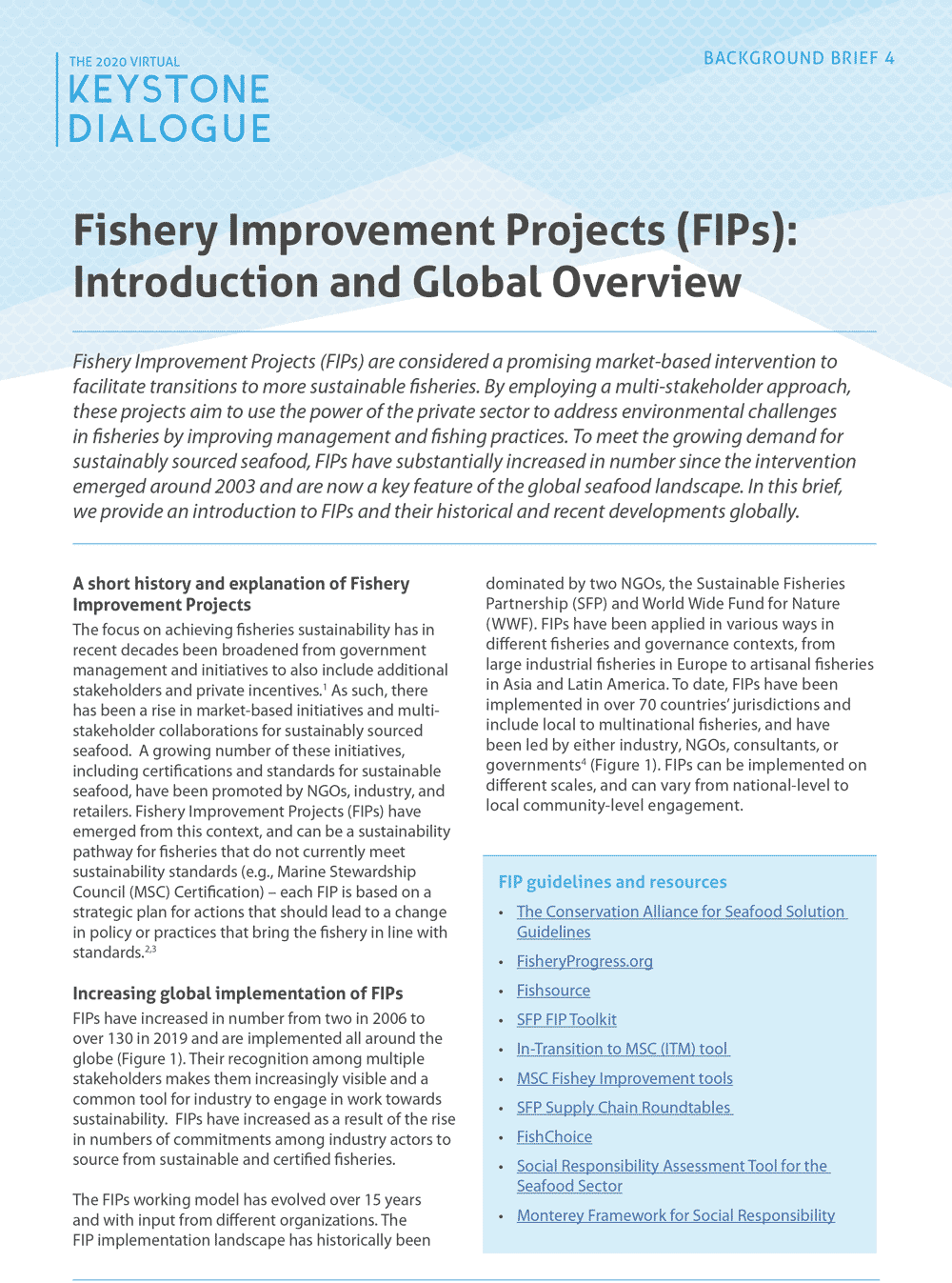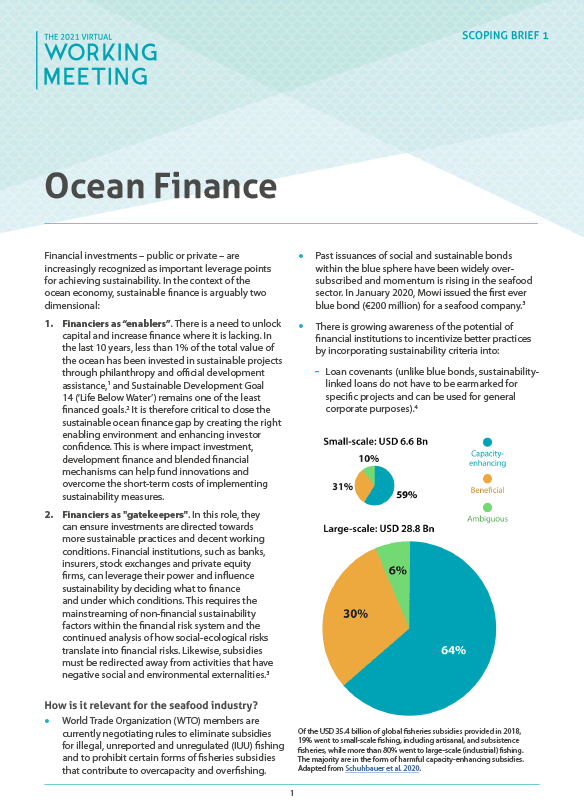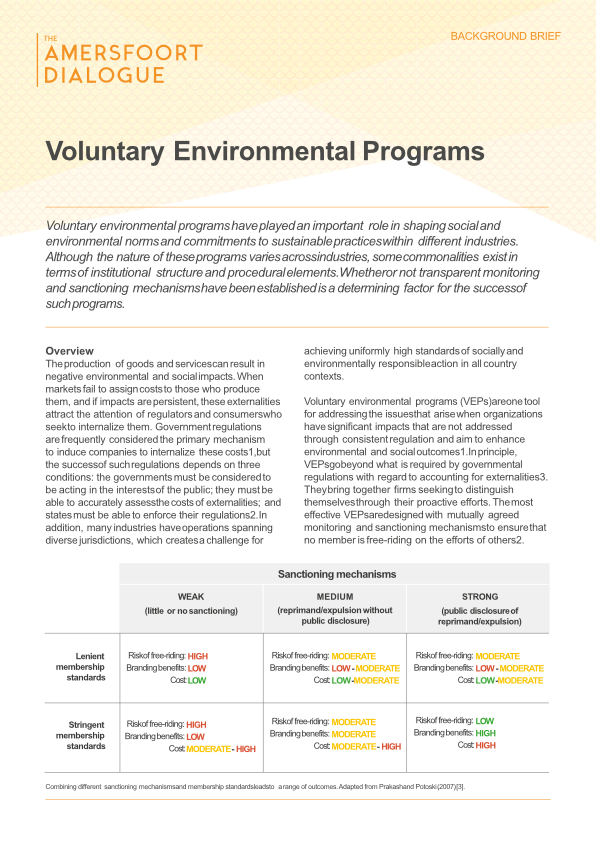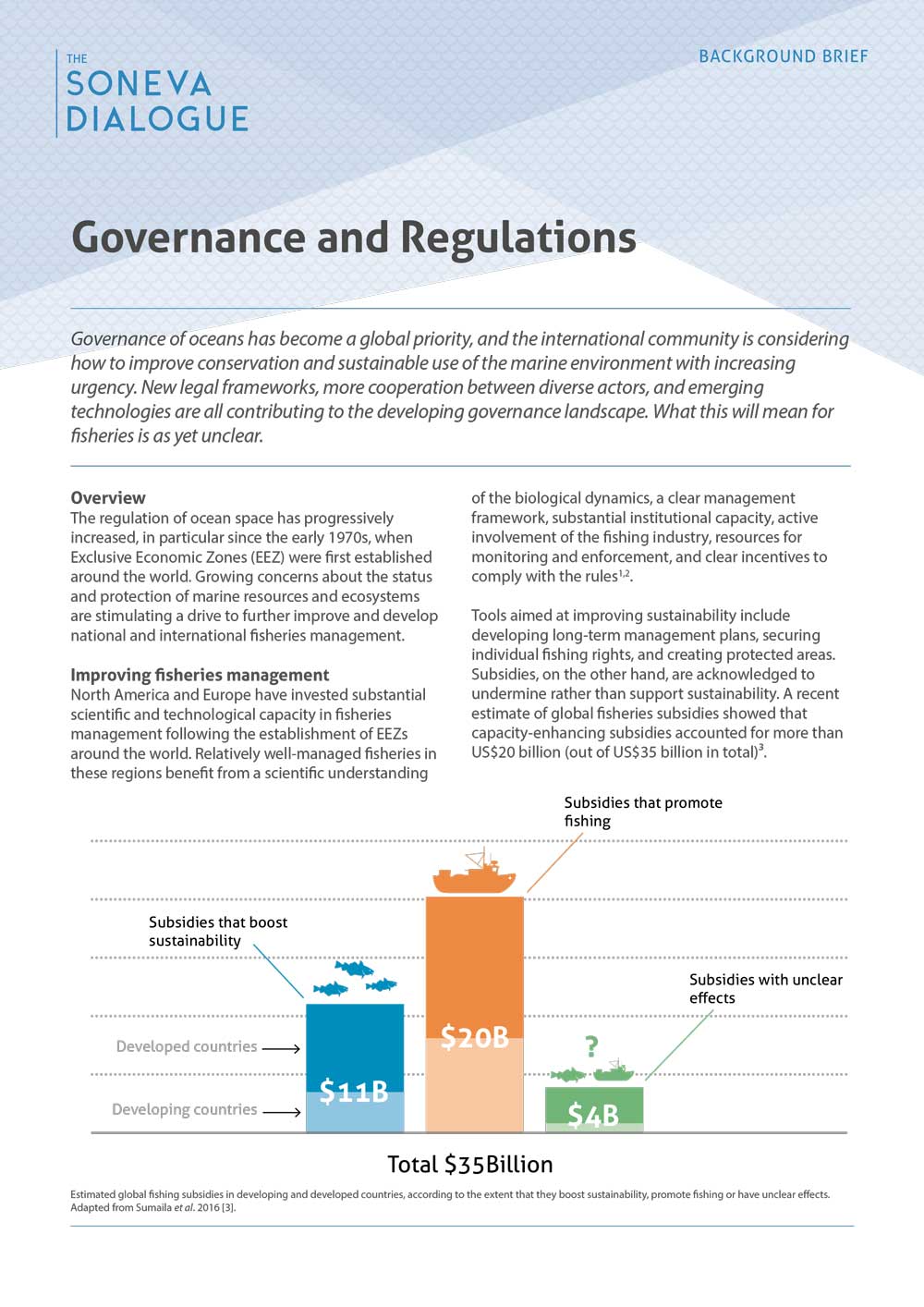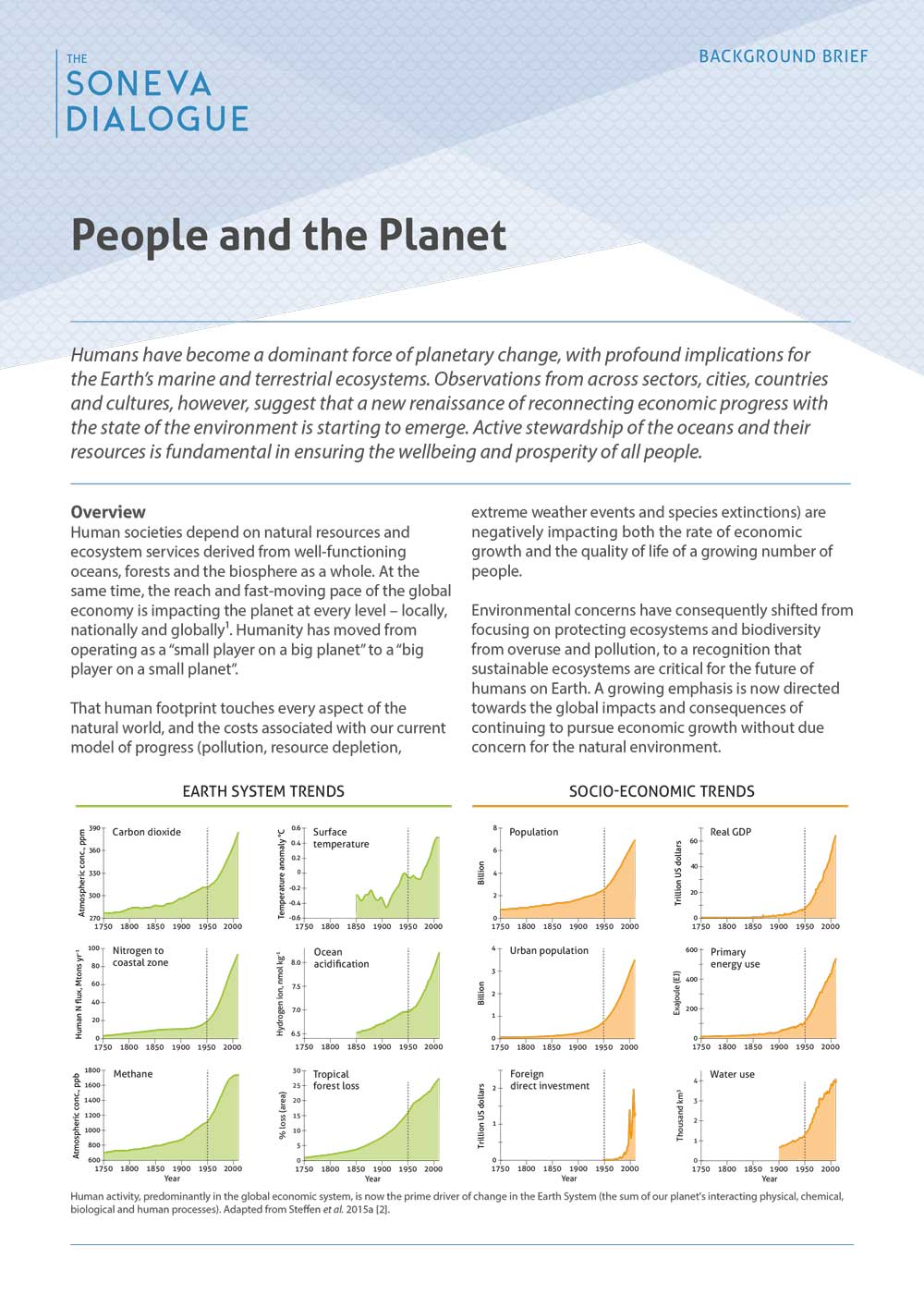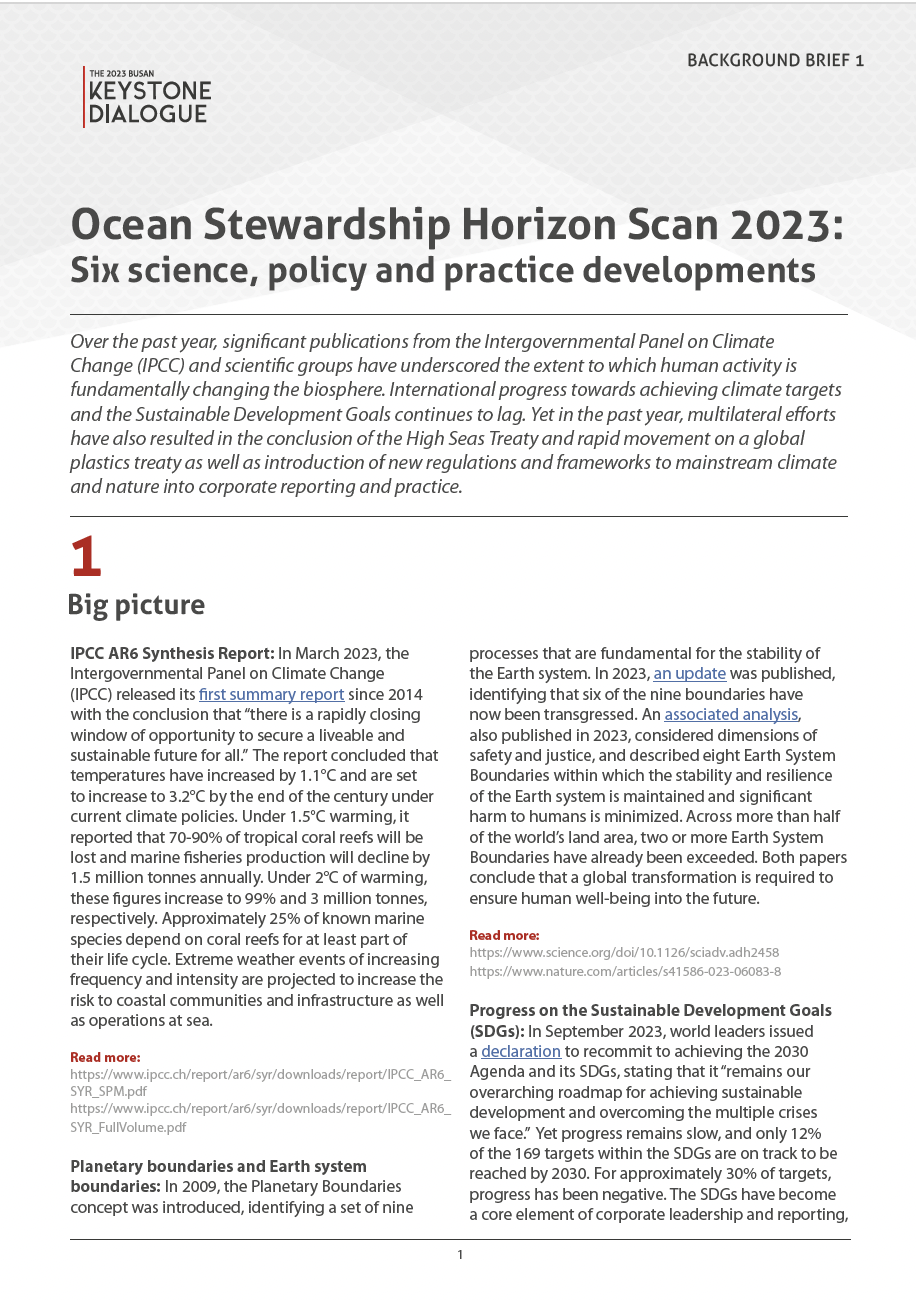The Knowledge
Scientific briefs
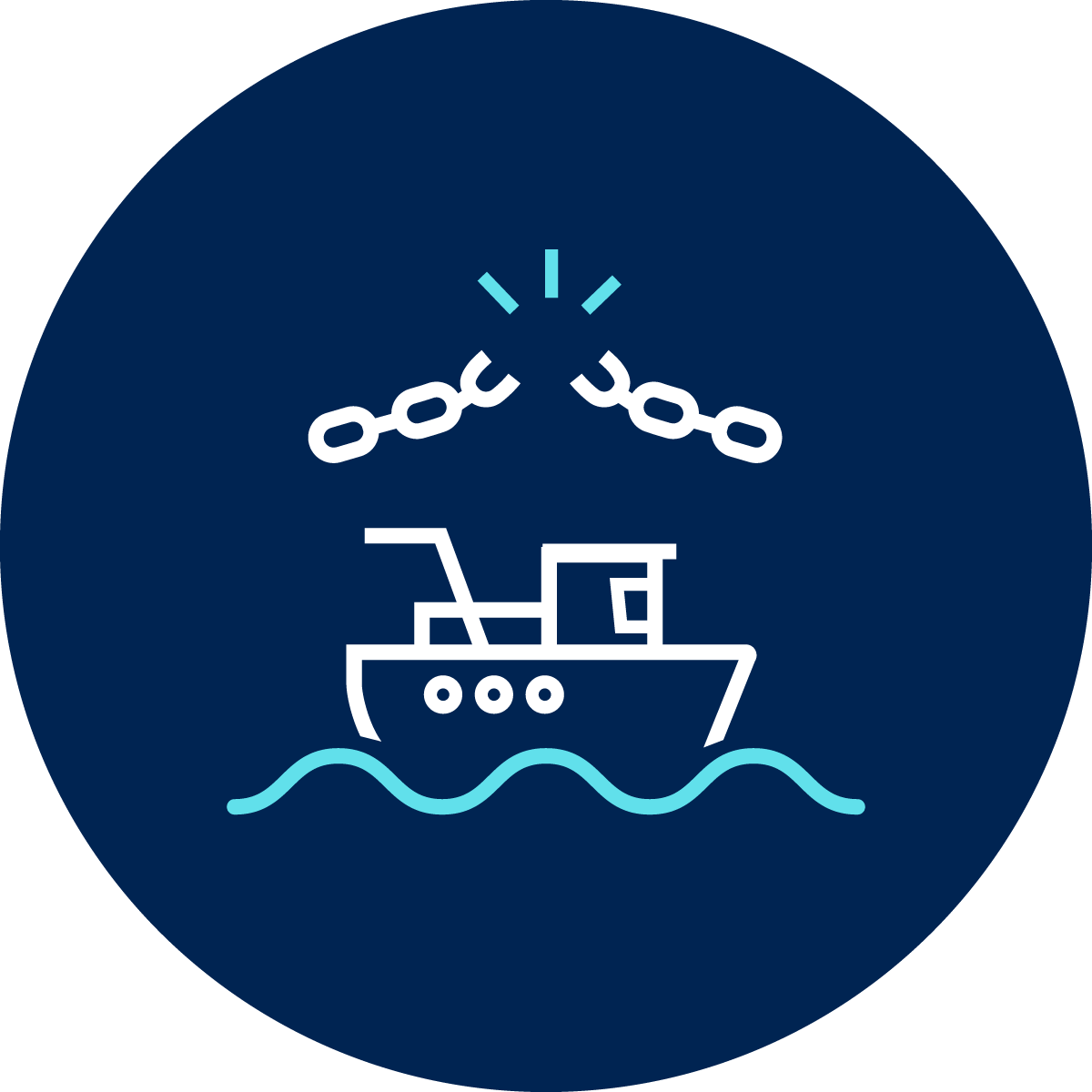
Task Force I
Reducing IUU fishing and eliminating modern slavery
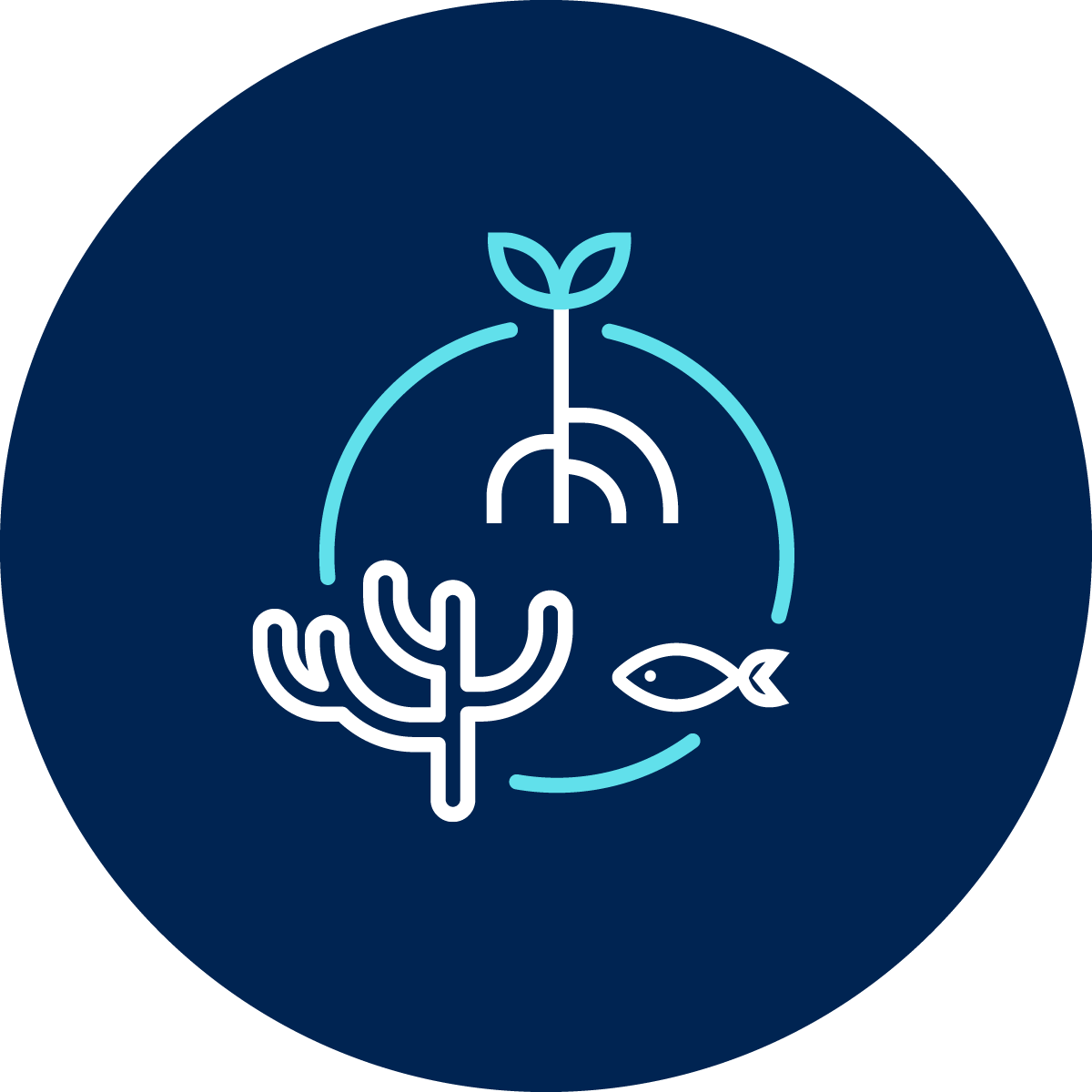
Task Force II
Advancing protection of endangered species
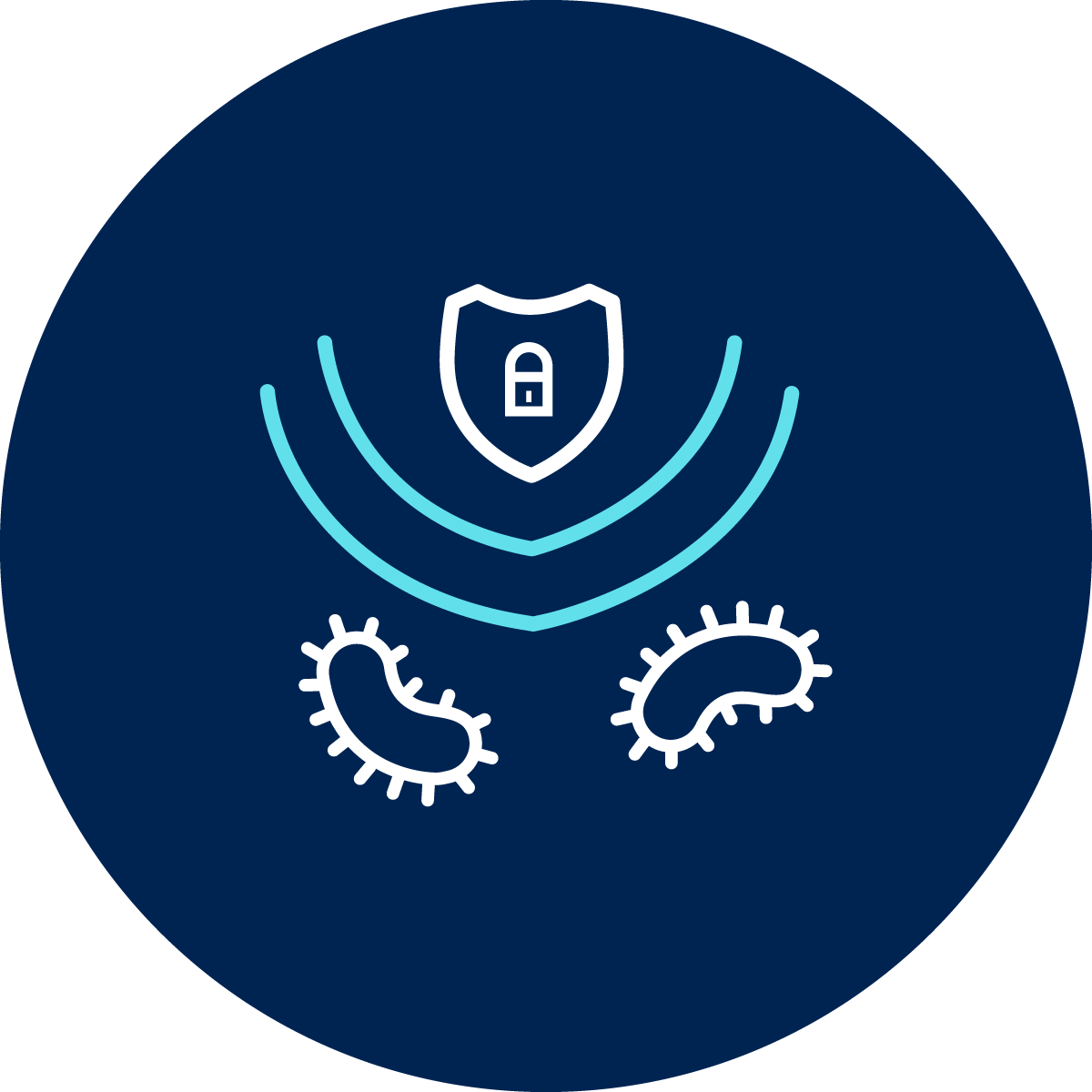
Task Force III
Reducing antibiotics use
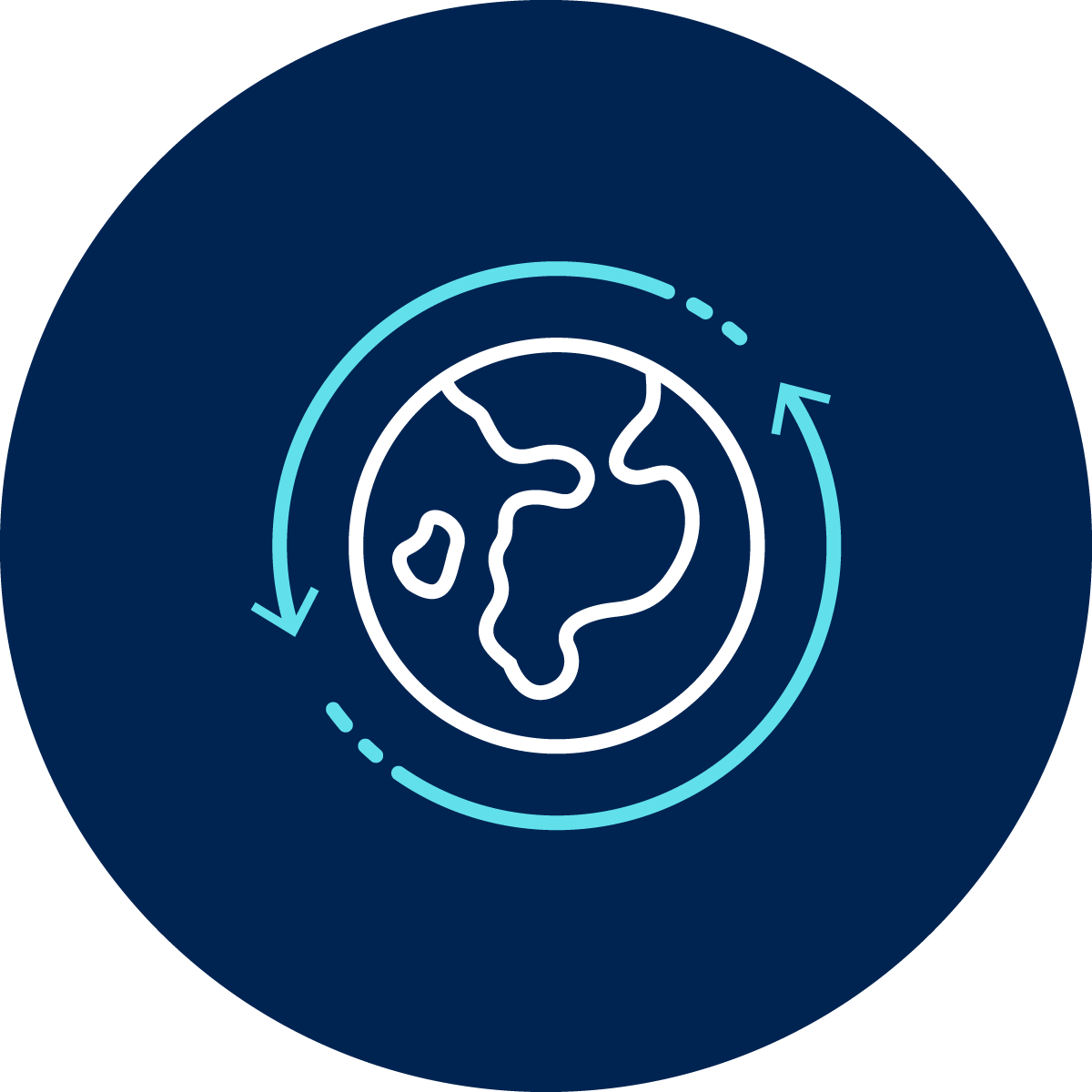
Task Force IV
Addressing climate change

Task Force V
Reducing plastic pollution
Corporate biosphere stewardship
General
Key peer-reviewed publications
Transnational Corporations as ‘Keystone Actors’ in Marine Ecosystems
Österblom, H., Jouffray J.-B., Folke, C., Crona, B., Troell, M., Merrie, A., Rockström, J. (2015). Transnational Corporations as ‘Keystone Actors’ in Marine Ecosystems. PLoS ONE, vol. 10, no. 5.
View abstract Read publicationAbstract
Keystone species have a disproportionate influence on the structure and function of ecosystems. Here we analyze whether a keystone-like pattern can be observed in the relationship between transnational corporations and marine ecosystems globally. We show how thirteen corporations control 11-16% of the global marine catch (9-13 million tons) and 19-40% of the largest and most valuable stocks, including species that play important roles in their respective ecosystem. They dominate all segments of seafood production, operate through an extensive global network of subsidiaries and are profoundly involved in fisheries and aquaculture decision-making. Based on our findings, we define these companies as keystone actors of the Anthropocene. The phenomenon of keystone actors represents an increasingly important feature of the human-dominated world. Sustainable leadership by keystone actors could result in cascading effects throughout the entire seafood industry and enable a critical transition towards improved management of marine living resources and ecosystems.
Emergence of a global science-business initiative for ocean stewardship
Österblom, H., Jouffray, J.-B., Folke, C., Rockström, J. (2017). Emergence of a global science-business initiative for ocean stewardship. Proceedings of the National Academy of Science, vol. 114, no. 34.
View abstract Read publicationAbstract
The ocean represents a fundamental source of micronutrients and protein for a growing world population. Seafood is a highly traded and sought after commodity on international markets, and is critically dependent on healthy marine ecosystems. A global trend of wild stocks being overfished and in decline, as well as multiple sustainability challenges associated with a rapid growth of aquaculture, represent key concerns in relation to the United Nations Sustainable Development Goals. Existing efforts aimed to improve the sustainability of seafood production have generated important progress, primarily at the local and national levels, but have yet to effectively address the global challenges associated with the ocean. This study highlights the importance of transnational corporations in enabling transformative change, and thereby contributes to advancing the limited understanding of large-scale private actors within the sustainability science literature. We describe how we engaged with large seafood producers to coproduce a global science–business initiative for ocean stewardship. We suggest that this initiative is improving the prospects for transformative change by providing novel links between science and business, between wild-capture fisheries and aquaculture, and across geographical space. We argue that scientists can play an important role in facilitating change by connecting knowledge to action among global actors, while recognizing risks associated with such engagement. The methods developed through this case study contribute to identifying key competences in sustainability science and hold promises for other sectors as well.
Accounting and accountability in the Anthropocene
Bebbington, J., Österblom, H., Crona, B., Jouffray, J.-B., Larrinaga, C., Russell, S., Scholtens, B. (2019). Accounting and accountability in the Anthropocene. Accounting, Auditing and Accountability Journal, vol. 33, no. 1., pp. 152-177.
View abstract Read publicationAbstract
Purpose – The purpose of this paper is to interrogate the nature and relevance of debates around the existence of, and ramifications arising from, the Anthropocene for accounting scholarship. Design/methodology/approach – The paper’s aim is achieved through an in-depth analysis of the Anthropocene, paying attention to cross-disciplinary contributions, interpretations and contestations. Possible points of connection between the Anthropocene and accounting scholarship are then proposed and illuminated through a case study drawn from the seafood sector. Findings – This paper develops findings in two areas. First, possible pathways for further development of how accounting scholarship might evolve by the provocation that thinking about the Anthropocene is outlined. Second, and through engagement with the case study, the authors highlight that the concept of stewardship may re-emerge in discussions about accountability in the Anthropocene. Research limitations/implications – The paper argues that accounting scholarship focused on social, environmental and sustainability concerns may be further developed by engagement with Anthropocene debates. Practical implications – While accounting practice might have to change to deal with Anthropocene induced effects, this paper focuses on implications for accounting scholarship. Social implications – Human well-being is likely to be impacted if environmental impacts accelerate. In addition, an Anthropocene framing alters the understanding of nature–human interactions and how this affects accounting thought. Originality/value – This is the first paper in accounting to seek to establish connections between accounting, accountability and the Anthropocene.
Six modes of co-production for sustainability
Chambers, J., Wyborn, C., Ryan, M., Reid, R.S., Riechers, M., Serban, A., Bennett, N., Cvitanovic, C., Fernandez-Gimenez, M.E., Galvin, K., Goldstein, B., Klenk, N., Tengö, M., Brennan, R., Cockburn, J., Hill, R., Munera, C., Nel, J., Österblom, H., Bednarek, A., Bennett, E., Brandeis, A., Charli-Joseph, L., Chatterton, P., Curran, K., Dumrongrojwatthana, P., Durán, A.P., Fada, S.J., Gerber, J.D., Green, J., Guerrero, A., Haller, T., Horcea-Milcu, A., Leimona, B., Montana, J., Rondeau, R., Spierenburg, M., Steyaert, P., Zähringer, J., Gruby, R., Hutton, J., Pickering, T. (2021) Six modes of co-production for sustainability. Nature Sustainability, vol. 4, pp. 983-996.
View abstract Read publicationAbstract
The promise of co-production to address complex sustainability challenges is compelling. Yet, co-production, the collaborative weaving of research and practice, encompasses diverse aims, terminologies and practices, with poor clarity over their implications. To explore this diversity, we systematically mapped differences in how 32 initiatives from 6 continents co-produce diverse outcomes for the sustainable development of ecosystems at local to global scales. We found variation in their purpose for utilizing co-production, understanding of power, approach to politics and pathways to impact. A cluster analysis identified six modes of co-production: (1) researching solutions; (2) empowering voices; (3) brokering power; (4) reframing power; (5) navigating differences and (6) reframing agency. No mode is ideal; each holds unique potential to achieve particular outcomes, but also poses unique challenges and risks. Our analysis provides a heuristic tool for researchers and societal actors to critically explore this diversity and effectively navigate trade-offs when co-producing sustainability.
Our future in the Anthropocene biosphere
Folke, C., Polasky, S., Rockström, J., Galaz, V., Westley, F., Lamont, M., Scheffer, M., Österblom, H., Carpenter, S. R., Chapin, S. III., Seto, K. C., Weber, E. U., Crona, B. I., Daily, G. C., Dasgupta, P., Gaffney, O., Gordon, L. J., Hoff, H., Levin, S. A., Lubchenco, J. Steffen, W., Walker, B. H. (2021). Our future in the Anthropocene biosphere. Ambio, vol. 50, pp. 834–869.
View abstract Read publicationAbstract
The COVID-19 pandemic has exposed an interconnected and tightly coupled globalized world in rapid change. This article sets the scientific stage for understanding and responding to such change for global sustainability and resilient societies. We provide a systemic overview of the current situation where people and nature are dynamically intertwined and embedded in the biosphere, placing shocks and extreme events as part of this dynamic; humanity has become the major force in shaping the future of the Earth system as a whole; and the scale and pace of the human dimension have caused climate change, rapid loss of biodiversity, growing inequalities, and loss of resilience to deal with uncertainty and surprise. Taken together, human actions are challenging the biosphere foundation for a prosperous development of civilizations. The Anthropocene reality—of rising system-wide turbulence—calls for transformative change towards sustainable futures. Emerging technologies, social innovations, broader shifts in cultural repertoires, as well as a diverse portfolio of active stewardship of human actions in support of a resilient biosphere are highlighted as essential parts of such transformations.
Scientific mobilization of keystone actors for biosphere stewardship
Österblom, H., Folke, C., Rocha, J., Bebbington, J., Blasiak, R., Jouffray, J.-B., Selig, E. R., Wabnitz, C. C. C., Bengtsson, F., Crona, B., Gupta, R., Henriksson, P. J. G., Johansson, K. A., Merrie, A., Nakayama, S., Ortuño Crespo, G., Rockström, J., Schultz, L., Sobkowiak, M., Søgaard Jørgensen, P., Spijkers, J., Troell, M., Villarrubia‑Gómez, P., Lubchenko, J. (2022). Scientific mobilization of keystone actors for biosphere stewardship. Nature Scientific Reports, vol. 12, no. 3802.
View abstract Read publicationAbstract
The biosphere crisis requires changes to existing business practices. We ask how corporations can become sustainability leaders, when constrained by multiple barriers to collaboration for biosphere stewardship. We describe how scientists motivated, inspired and engaged with ten of the world’s largest seafood companies, in a collaborative process aimed to enable science-based and systemic transformations (2015–2021). CEOs faced multiple industry crises in 2015 that incentivized novel approaches. New scientific insights, an invitation to collaborate, and a bold vision of transformative change towards ocean stewardship, created new opportunities and direction. Co-creation of solutions resulted in new knowledge and trust, a joint agenda for action, new capacities, international recognition, formalization of an organization, increased policy influence, time-bound goals, and convergence of corporate change. Independently funded scientists helped remove barriers to cooperation, provided means for reflection, and guided corporate strategies and actions toward ocean stewardship. By 2021, multiple individuals exercised leadership and the initiative had transitioned from preliminary and uncomfortable conversations, to a dynamic, operational organization, with capacity to perform global leadership in the seafood industry. Mobilizing transformational agency through learning, collaboration, and innovation represents a cultural evolution with potential to redirect and accelerate corporate action, to the benefit of business, people and the planet.
Revealing global risks of labor abuse and illegal, unreported, and unregulated fishing
Selig, E. R., Nakayama, S., Wabnitz, C. C. C., Österblom, H., Spijkers, J., Miller, N. A., Bebbington, J. and Decker Sparks, J. L. (2022). Revealing global risks of labor abuse and illegal, unreported, and unregulated fishing. Nature Communications, vol. 13, no. 1612.
View abstract Read publicationAbstract
Labor abuse on fishing vessels and illegal, unreported and unregulated (IUU) fishing violate human rights, jeopardize food security, and deprive governments of revenues. We applied a multi-method approach, combining new empirical data with satellite information on fishing activities and vessel characteristics to map risks of labor abuse and IUU fishing, understand their relationships, and identify major drivers. Port risks were globally pervasive and often coupled, with 57% of assessed ports associated with labor abuse or IUU fishing. For trips ending in assessed ports, 82% were linked to labor abuse or IUU fishing risks. At-sea risk areas were primarily driven by fishing vessel flags linked to poor control of corruption by the flag state, high ownership by countries other than the flag state, and Chinese-flagged vessels. Transshipment risk areas were related to the gear type of fishing vessels engaged in potential transshipment and carrier vessel flags. Measures at port offer promise for mitigating risks, through the Port State Measures Agreement for IUU fishing, and ensuring sufficient vessel time at port to detect and respond to labor abuse. Our results highlight the need for coordinated action across actors to avoid risk displacement and make progress towards eliminating these socially, environmentally and economically unsustainable practices.
Other key publications
The SeaBOS initiative has yielded not only a scientific narrative and an example of novel collaboration, but also a deeply human story. One shaped by relationships, doubts, optimism, worries, fatigue and excitement. This more personal perspective has been captured in a 2023 book, The Sounds of Science: Orchestrating Stewardship in the Seafood Industry
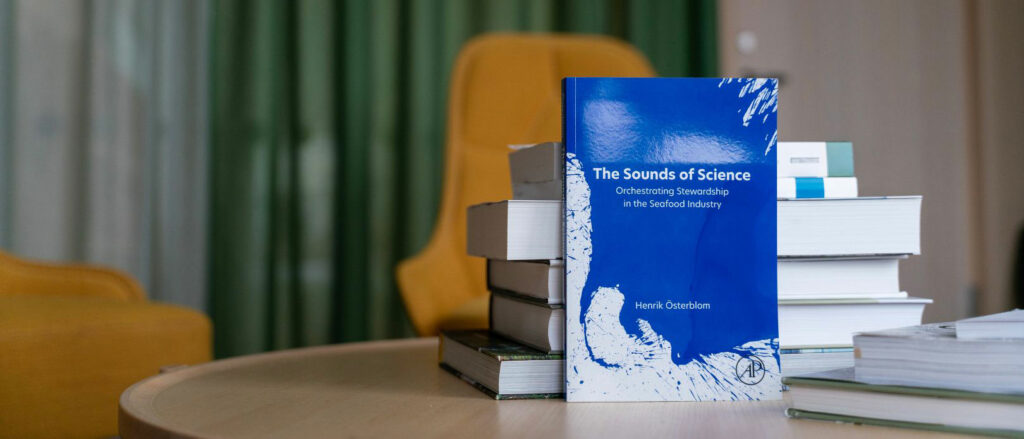
 Task Force I
Task Force I 